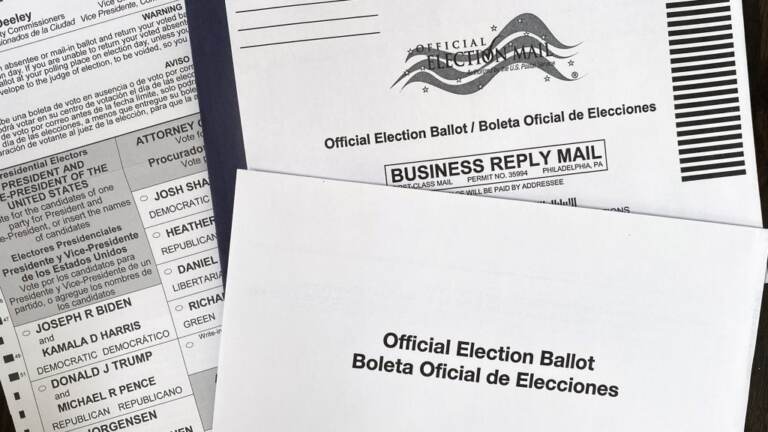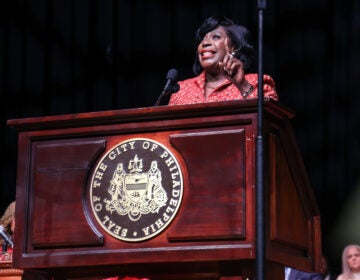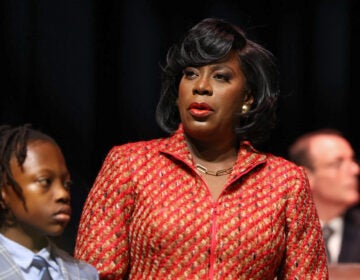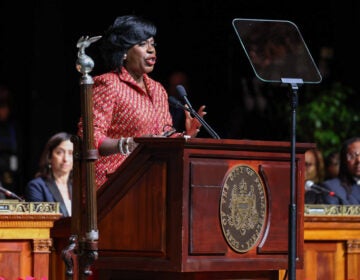Election 2023 updates: Parker makes history; some Philly races too close to call
Follow along for live special coverage on the 2023 primary election.
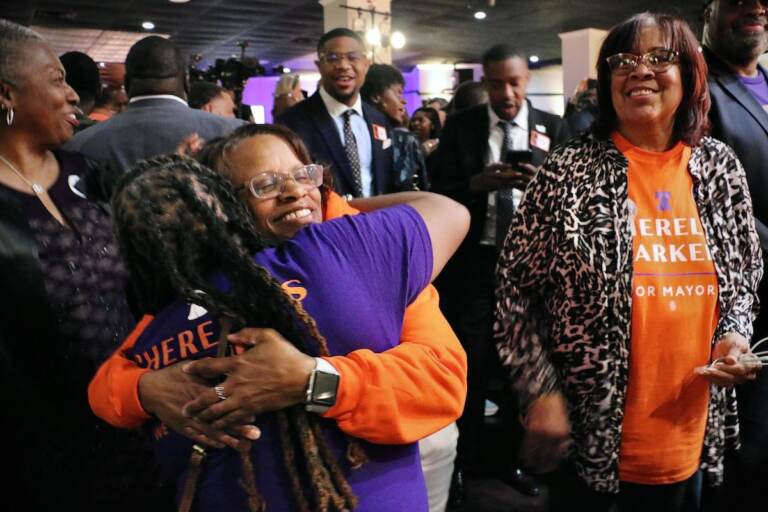
Cherelle Parker's supporters celebrate at Laborers Local 332 as she pulls ahead in the race for mayor of Philadelphia. (Emma Lee/WHYY)
What you need to know
- Cherelle Parker made history after besting eight other Democrats in the primary for Philly mayor
- Democrats maintained their majority in the Pa. house as Heather Boyd defeated Katie Ford in Delco
- In Philly’s district City Council races, some races are still too close to call
- For City Council at large, Rue Landau and Nina Ahmad joined three incumbents as Democrats’ top picks
- Here’s where voters landed on Philly’s several ballot questions
- See election results as they come in: Pennsylvania | Philadelphia
Election Day dispatches
-
The Towamencin fight to stop a sewer sale continues: Voters support a new local law that that prohibits privatization
May. 17, 2023 4:53 pm
-
Ed Brown wins Upper Darby’s Democratic mayoral primary
May. 17, 2023 10:18 am
-
Winder, Makhija win Democratic primary in Montco commissioners race; DiBello, Ferry take it for Republicans
May. 17, 2023 11:47 am
-
City Council at large: Rue Landau, Nina Ahmad join three incumbents as Democrats’ top picks
May. 17, 2023 7:45 am
-
Cherelle Parker makes history with Philly mayoral primary win
May. 17, 2023 1:18 am
The Towamencin fight to stop a sewer sale continues: Voters support a new local law that that prohibits privatization
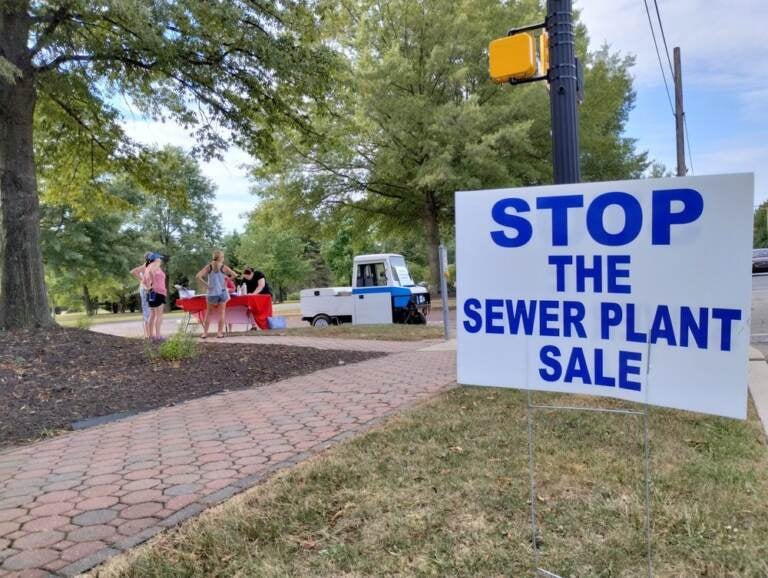
On May 16, Towamencin residents vote on a new local law that forbids the privatization of its sewer system. (Towamencin NOPE)
A movement to stop a sewer system sale in Towamencin, Montgomery County, has made strides.
Towamencin residents passed a new local law forbidding the privatization of the township’s sewer system.
The suburban Philadelphia township is one of the many Pennsylvania communities battling the privatization of public water and sewer systems. Towamencin NOPE, “Towamencin Neighbors Opposing Privatization Efforts,”has been working towards this day for about a year.
In November’s general election, residents voted to create a Government Study Commission. That commission, made up of NOPE residents, wrote a new home rule charter prohibiting the sale of water, wastewater, and stormwater systems.
That charter made it onto Tuesday’s ballot and passed by 310 votes. Supporters led with 2,728 votes, against 2,418 votes in opposition, according to unofficial election results Wednesday morning. 5,282 votes were cast, out of the 13,147 registered voters.
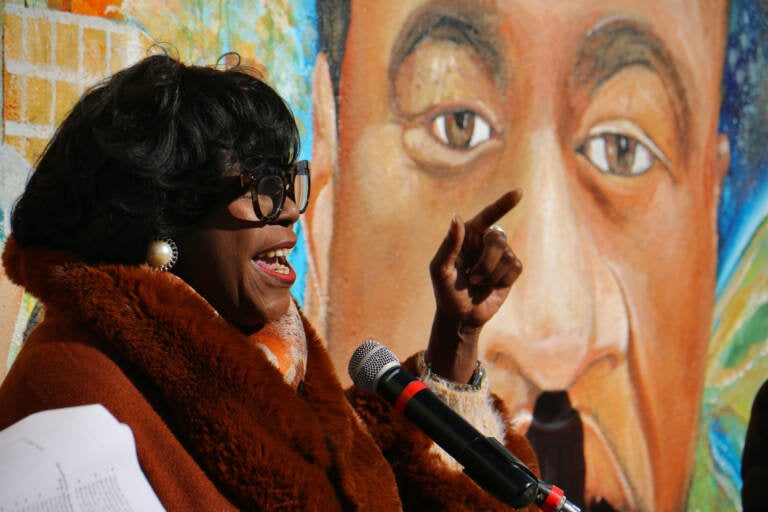
File photo: Then Philadelphia City Councilmember Cherelle Parker speaks at the dedication of a George Floyd tribute mural in the city's Olney neighborhood. (Emma Lee/WHYY)
Cherelle Parker is poised to become the first Black woman to be elected mayor of Philadelphia after her primary win Tuesday night.
With no statewide or federal election at the top of the ticket, voter turnout was relatively low, with about 200,000 voters casting ballots. That turned the mayor’s race into a contest of who could bring out the most voters. Parker won that battle with the help of the Democratic party.
Veteran of Philadelphia politics Bill Greenlee said Parker’s win was the result of a great deal of grassroots campaigning, coupled with her status as the only viable Black woman in the race.
“I think they saw somebody that they could relate to more. They talked about the real issue out there, and one of them is the public safety issue,” Greenlee said. “She was straightforward enough to say, look, ‘I think we need more police.’ I know progressives, some progressives don’t like that, but I think that resonated with people, the regular neighborhood people, which is where she got her votes.”
» MORE: Cherelle Parker’s keys to victory in Philly mayoral race: Door-knocking and individualism
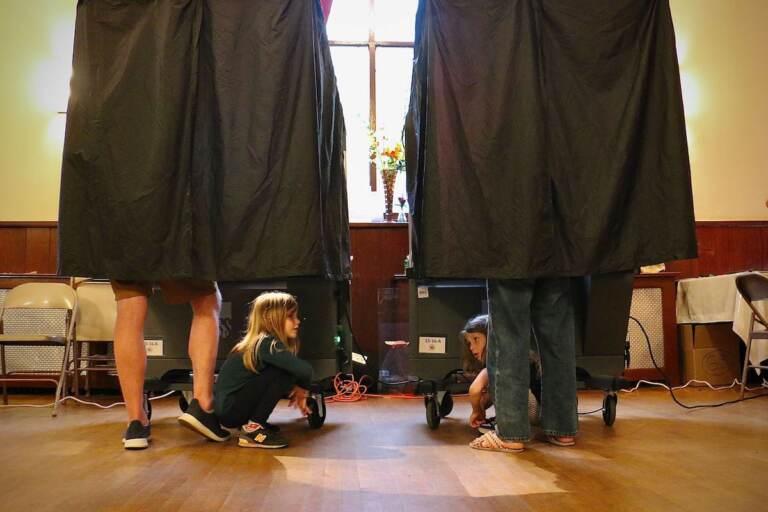
Children talk under the curtains as their parents vote at St. Andrew Church in Fairmount. (Emma Lee/WHYY)
Inside Robeson High School in West Philly, Chi-hyun Kim serves as a judge of elections, monitoring other poll workers. He’s been doing so for about four years.
“Democracy is important,” he said, “it’s a good way to serve the community.”
Poll workers at both Robeson and Walnut Street West Library were quick to pass out sample ballots, remind voters to fill out ballot questions, and give advice on how to engage more with local politics.
At Robeson High School and beyond, primary voters weighed in on a crowded Philly mayoral election and 17 City Council races, among other contests.
Cherelle Parker made history after besting eight other Democrats for that party’s mayoral nomination. The former City Council member, who will face Republican David Oh in the November general election, is on track to become first Black woman elected to the office.
Follow WHYY News for ongoing live coverage of the Philadelphia primary.
As ballots continue to be counted, here’s a look at some of the scenes that unfolded across the city on Election Day, in photos.
Winder, Makhija win Democratic primary in Montco commissioners race; DiBello, Ferry take it for Republicans
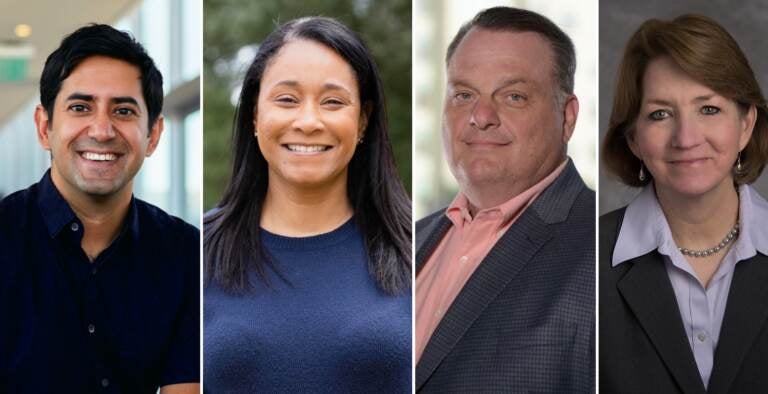
Candidates in the Montgomery County commissioners race, from left to right: Neil Makhija, Jamila Winder, Tom DiBello, and Liz Ferry. (Courtesy of candidates' respective campaigns)
After a contentious and crowded contest, Jamila Winder and Neil Makjiha have won the Democratic primary in the Montgomery County commissioners race.
For Republicans, running mates Tom DiBello and Liz Ferry edged out incumbent Joe Gale.
Those four will proceed to the November general election, running for two seats and the control of the three-seat board of commissioners. The Democrats are favored, since the county is majority registered Democrats. The minority party is reserved one seat on the board.
Winder led with 54,744 votes out of about 92,000 cast, according to unofficial election results early Wednesday morning. An education company executive and previous East Norriton supervisor, Winder was the only candidate endorsed by the county’s Democratic Committee. She was appointed to fill Dr. Val Arkoosh’s spot when Arkoosh was tapped to work for Gov. Josh Shapiro, an she became the first woman who identifies as African American to serve on the board of commissioners.
Makhija followed with 38,458 votes. He’s a lawyer, election law professor at the University of Pennsylvania, and civil and voting rights advocate from Lower Merion. He is making history as the first Asian American elected on the county’s board of commissioners.
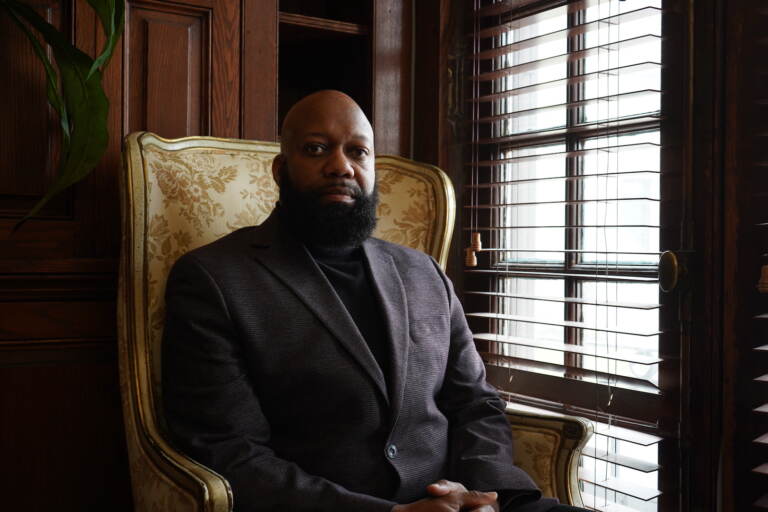
Ed Brown won Upper Darby’s mayoral election. (Kenny Cooper/WHYY)
Ed Brown has defeated Laura Wentz in the Democratic primary in Upper Darby’s mayoral race.
Council President Brian Burke ran unopposed in the Republican primary. Brown and Burke will now face off in November to become the next mayor of Upper Darby.
Brown, 55, received the unanimous endorsement from the Upper Darby Democratic Committee over Wentz, the current vice president of the township council.
During his campaign, Brown touted a five-point plan to put the township on sound footing for the future, which included investing in the business sector, providing quality municipal services, and providing affordable housing.
Brown is the president of the Upper Darby School District Board of Directors and works in cybersecurity engineering.
Burke, 57, has served as a council member since 2019. Originally elected as a Democrat, Burke switched parties in 2022 following a dispute with Mayor Barbarann Keffer’s administration and local party leaders over the handling of the township’s allotment of American Rescue Plan Act funding.
His campaign has put a spotlight on tax reform, public safety, and the improvement of public parks.
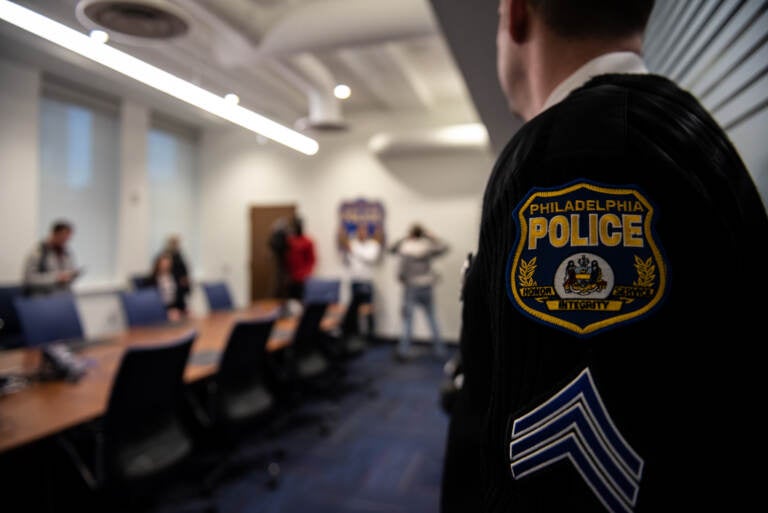
File photo: The police commissioner's conference room in the Philadelphia Public Safety Building. (Erin Blewett for Billy Penn)
One out of four of the proposed ballot questions was rejected by voters, reversing a common tendency for such questions to pass by wide margins in Pennsylvania.
With nearly three-quarters of precincts reporting, ballot question No. 3 failed to pass, with 54% of voters voting no on loosening requirements for the hiring of police oversight board staff to provide more flexibility in hiring.
The other three proposals to amend the Philadelphia Home Rule Charter passed by solid margins.
The charter change questions were the only thing on the May 16 primary ballot open to all voters, no matter whether they’re registered with a major political party or not.
The charter is like a city constitution, overseeing the structure, roles and responsibilities of local government. It was created on April 17, 1951, and gets amended all the time. City Council first debates and then votes on potential changes, placing them on the next municipal election ballot. Voters then have to approve them by simple majority.
» MORE: Philly voters reject charter change for police oversight hiring, approve new public safety director
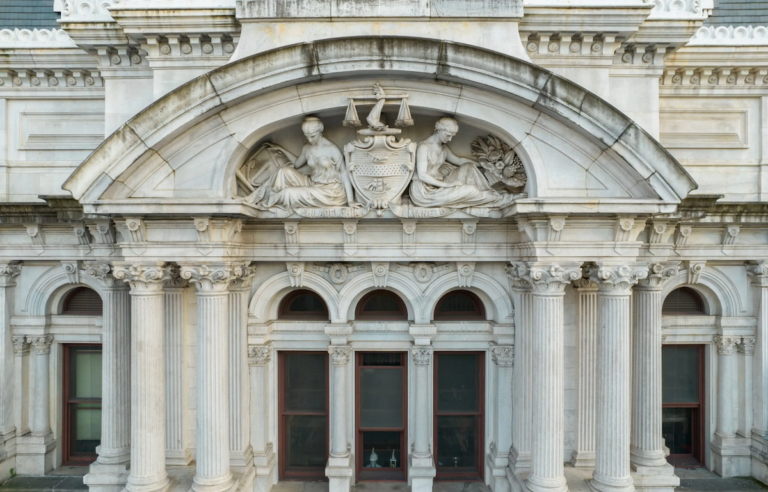
The Philadelphia City Seal. (Mark Henninger/Imagic Digital)
An incumbent appeared to be ousted in one of the Democratic primary contests for Philadelphia’s so-called row offices.
Party-endorsed challenger John Sabatina beat sitting Register of Wills Tracey Gordon, who had been accused of retaliating against employees if they declined to contribute to her reelection campaign. With 90% of precincts reporting, Sabatina garnered 33% of the vote, over Gordon’s 30%.
Sheriff Rochelle Bilal appeared to hold off her challenger and is likely headed to reelection in November, beating Michael Untermeyer despite numerous scandals during her tenure and a report that her office is being investigated by the FBI. Bilal led with 43% of the vote, versus Untermeyer’s 41%.
For City Controller’s Office, Christy Brady definitively won the nomination to serve out the two years remaining following Rebecca Rhynhart’s resignation last year. The three contenders for the Office of City Commissioners won their races after running for reelection unchallenged.
» MORE: Philadelphia row offices: Challenger leads register of wills, while incumbent holds sheriff
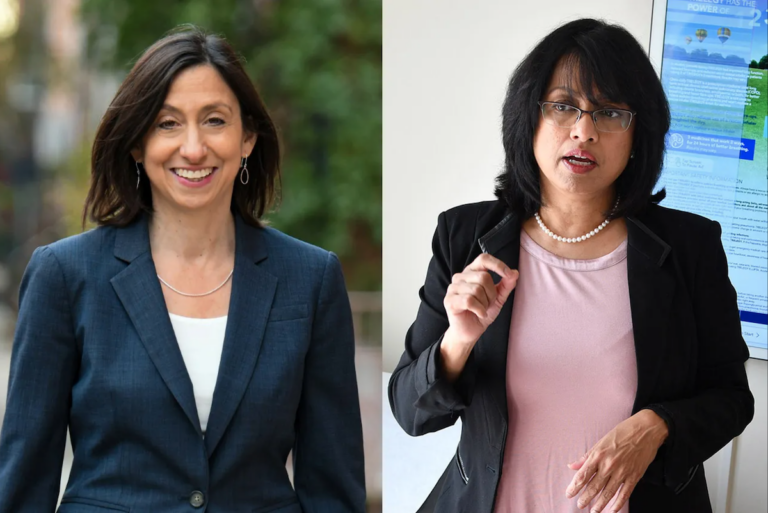
Rue Landau, left, and Nina Ahmad, right, were among the top vote-getters on the Democratic side. (Landau and Ahmad campaigns)
The results for at-large City Council seats in the May primary show historic results that could see Philadelphia get its first openly LGBTQ lawmaker in Rue Landau, and first South Asian American lawmaker in Nina Ahmad.
“To my wife, my son, my team, my city: Thank you,” Landau posted on Twitter after her win.
“This has been a long journey for a young woman from Bangladesh who came to find an opportunity for a better life,” Ahmad said in a statement after her victory. “Now, to have the chance to represent the city that has been so good to me, it is the epitome of a dream come true.”
The two women were among the top five on the Democratic side, and will advance to the November election, alongside incumbents Isaiah Thomas — the top vote-getter overall, with more than 90,000 voters choosing his name — and Katherine Gilmore Richardson and Jim Harrity.
Republicans Drew Murray, Frank Cristinzio, Jim Hasher, Gary Grisafi, and Mary Jane Kelly will also appear on the general election ballot this fall.
» MORE: City Council at large: Rue Landau, Nina Ahmad join three incumbents as Democrats’ top picks
District City Council results: Bass locked in tight race with Anderson-Oberman, Lozada and Phillips hold off challengers
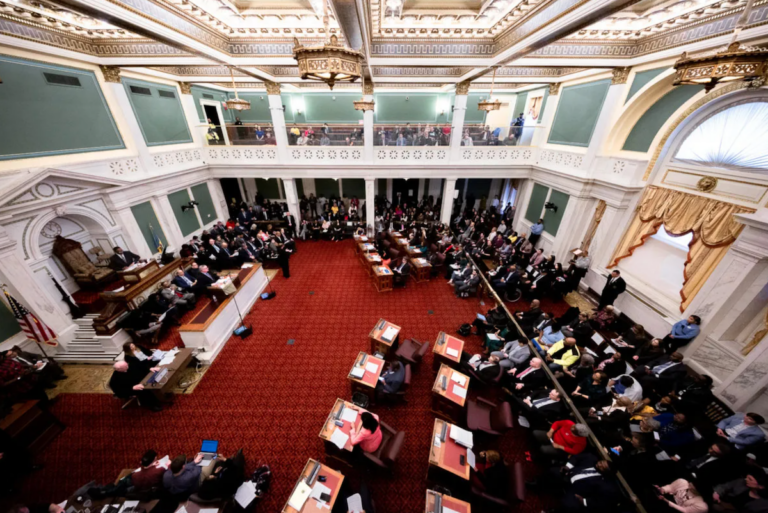
Philadelphia City Council Chambers. (PHL Council)
Incumbents easily won in two of Philadelphia’s contested City Council district races in the May primary, but a third was still locked in a tight battle on Wednesday morning.
Councilmembers Quetcy Lozada in District 7 and Anthony Phillips in District 9 held onto their newly-acquired seats. Each has been in office just a few months, after winning special elections in November.
In District 8, however, three-term incumbent Cindy Bass was showing 50.5% of the vote on Wednesday morning, compared to 49.3% for union organizer Seth Anderson-Oberman — a difference of fewer than 300 votes. Nearly a fifth of precincts had not yet been tallied, according to city election results, along with some mail ballots, so the outcome was still unclear.
The district spans parts of North Philly as well as Northwest Philadelphia’s Chestnut Hill, Mount Airy, Germantown, Nicetown, Tioga, and Logan neighborhoods.
In all other districts, a single candidate was running unopposed — and in all but Northeast Philly’s District 10, these primary winners likely won’t face challengers in the general election this November.
Democratic nominee Cherelle Parker absent from election night watch party following reported medical emergency

File photo: Mayoral candidate Cherelle Parker participates in the Restoring Safety Forum at WHYY. (Emma Lee/WHYY)
Cherelle Parker’s historic night securing the Democratic nomination for Philadelphia mayoral race was missing her victory speech thanking supporters.
The former Council member was absent from the party at the laborers’ union hall in North Philadelphia after a recent dental issue required medical attention Tuesday night, a campaign spokesperson told the Philadelphia Inquirer.
Parker defeated eight other Democratic candidates in what was expected to be a close race ahead of the November general election.
As seven out of 10 voters in Philadelphia are registered as democrats, Parker will likely become the first woman, and the first Black woman, to lead the city. Former Councilmember David Oh will be the Republican nominee after running uncontested in that primary.

Rue Landau celebrated with her supporters at Love City Brewing on Tuesday after emerging as one of the top five vote getters in the Councilmember at-large Democratic primary. (Cory Sharber/WHYY)
Philadelphia could have its first openly LGBTQ council member after Rue Landau emerged amongst the top five vote getters in the Democrat council primary at-large primary Tuesday.
During an election watch party at Love City Brewing, Landau and her supporters celebrated the solid showing at the polls. She placed third in the Democratic primary with more than 53,000 votes.
Landau said the historic importance of her victory shows “there’s been a big vacancy that needed to be filled, to give the LGBTQ community a seat at the table.”
“To make sure that LGBTQ kids all over the city feel like they have options and opportunities, to be able to open up some of those spaces for them, it means the world to me,” Landau said. “I think it will really help to transform our community in a way where we get more seats at the table.”
Landau served as the city’s Commission on Human Relations and Fair Housing Commission and has served as the director of law and policy for the Philadelphia Bar Association. She was the only non-incumbent council candidate to be endorsed by the full Democratic City Committee, and she’s also been endorsed by the Working Families Party.
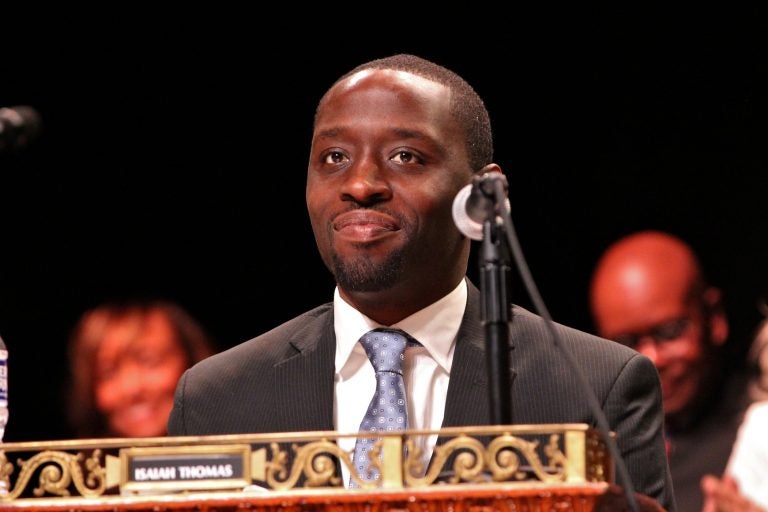
Philadelphia City Council member Isaiah Thomas. (Emma Lee/WHYY)
The three Democrat City Council members at-large retained their spots during Tuesday’s primary, including Isaiah Thomas, who received the most votes.
Thomas won his seat in 2019 on his third attempt. He chairs the Streets Committee and is vice chair of the Children and Youth Committee. He hosts an annual Black-Owned Business Crawl, sponsored a Driving Equality bill that banned traffic stops for minor offenses, and introduced legislation to reward residents for reporting illegal dumping.
When he heard the news at The Winston in Old City late Tuesday, Thomas said it was “overwhelming.”
“It speaks to the work that we’re doing as it relates to the city of Philadelphia, and I’m hoping that I can continue that work, that the citizens are saying that they’re proud of,” Thomas said.
Thomas received endorsements from the Democratic City Committee and the Working Families Party.
Fellow incumbents Katherine Gilmore Richardson and Jim Harrity retained their spots as well, and will be joined by Rue Landau and Nina Ahmad on the November ballot.
Registered Democrats in Philly outnumber Republicans seven to one, so Tuesday’s Democratic primary winners are expected to earn their spots in November.
During the general election, the majority party, in this case the Democrats, can win as many as five at-large seats.
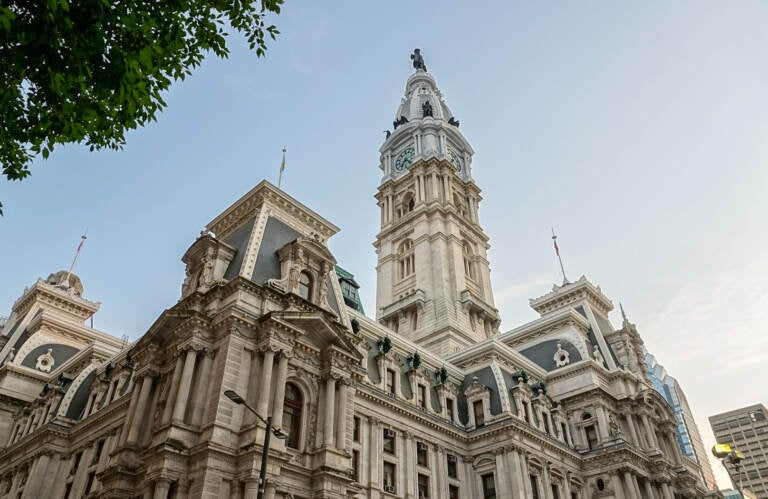
A closeup of Philadelphia City Hall. (Mark Henninger/Imagic Digital)
With the historic victory of Democratic mayoral candidate Cherelle Parker, her fellow candidates officially conceded following the primary election results.
Former City Controller Rebecca Rhynhart was in a distant second place when she gave a concession speech around 11:30 p.m.
“Our campaign was about fighting against the Democratic machine and the status quo of how things are done in Philly,” Rhynhart said, vowing to keep building the coalition that formed around her campaign.
“Change doesn’t always happen the way you want it to, but that’s okay — because we’ll keep fighting.”
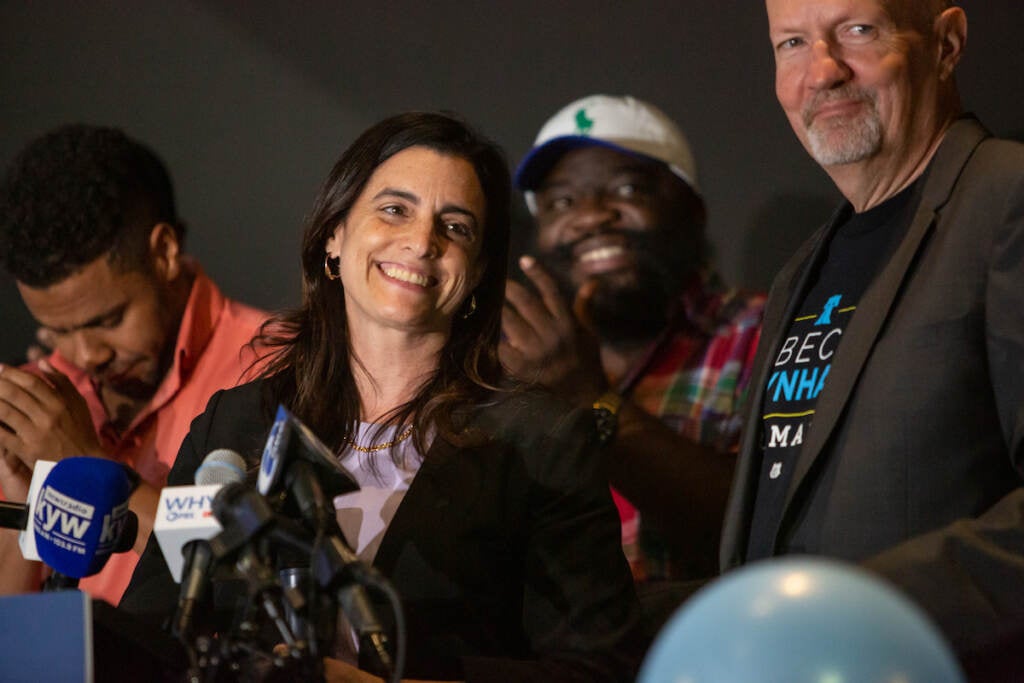
(Emily Cohen/WHYY)
Former City Councilmember Helen Gym, whose platform focused heavily on education, told supporters her campaign was rooted in values — not any one candidate.
“The right to fully-funded public schools. For dignity and protections at work. We believed in housing as a human right. And a safe city for all of us,” she said as she conceded victory to Parker.

- Helen Gym at campaign watch party
(Kimberly Paynter/WHYY)
Former City Councilmember Allan Domb, the “Condo King,” gave his concession from atop a rooftop bar at a Center City building he owns. He said the results were “not what we expected and hoped for.”
“Philadelphia is in crisis, and as someone who has built a successful business here in our city, created jobs, served in government, I thought I could bring to the city a unique perspective and provide the leadership the city of Philadelphia desperately needs,” the real estate broker said to a room full of friends, coworkers, and supporters.

(Becca Haydu/WHYY)
“I’m a first-time candidate, and we gave it a hell of a run,” grocery store magnate Jeff Brown said to a room full of supporters. “We stand for something. We are tired of a tale of two cities. We want to fix this.”

- Jeff Brown concedes at election watch party
(Meir Rinde/WHYY)
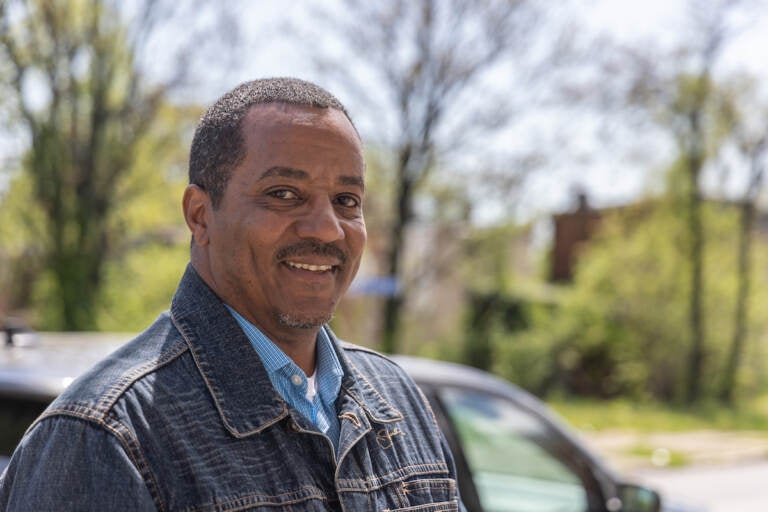
Stefan Roots is a Democratic candidate for mayor of Chester City. (Kimberly Paynter/WHYY)
The high-stakes, three-headed race to become the next mayor of Chester and to lead the city out of bankruptcy is likely over.
First-term Councilmember Stefan Roots has declared victory over incumbent Mayor Thaddeus Kirkland and real estate broker Pat Worrell in the Democratic primary. The race had not officially been called as of Tuesday night.
“Wow. I’m feeling like Chester is looking for a change, so now a lot of weight is on my shoulder,” Roots told WHYY News. “I’m that guy who has to be that change agent.”

Allan Domb addresses supporters at his campaign party at the Continental Midtown on the night of the primary election (Becca Haydu/WHYY)
Former City Councilmember and “Condo King” Allan Domb admitted defeat in the Democratic primary election for mayor of Philadelphia.
“Today’s results are not what we expected and hoped for,” the real estate broker said to a room full of friends, coworkers, and supporters, at a Center City rooftop bar in one of the more than 400 properties he owns in the city.
“Philadelphia is in crisis, and as someone who has built a successful business here in our city, created jobs, served in government, I thought I could bring to the city a unique perspective and provide the leadership the city of Philadelphia desperately needs.”
The race was called for former City Council member Cherelle Parker after Domb spoke.
“I believe the 100th mayor will be a woman of the city of Philadelphia, and I am proud that that’s going to happen in Philadelphia tonight,” he said.
Domb was elected to City Council as an at-large council member in 2015 and again in 2019. He resigned to run for mayor in August 2022.
Domb mostly self-funded his campaign with upwards of $10 million of his own money. He trailed Parker, former City Controller Rebecca Rhynhart, and former City Council member Helen Gym, with roughly 12% of the vote by the time the race was called.
“We did everything we possibly could,” he told reporters earlier in the evening, as results rolled in.
During his campaign, Domb said Philly was in a “public safety crisis, a poverty crisis, an affordable housing crisis, and an education crisis,” and positioned himself — with a background in both business and politics — as the right leader to solve these issues.
Domb was born in New Jersey to a working-class family, and worked a variety of jobs including shining shoes at the age of four. He got into selling real estate in his 20s, then founded his own firm and garnered national acclaim as a residential salesperson. Domb’s company sells luxury condos in Center City and other upscale neighborhoods, including the Art Museum area, Washington Square, and Society Hill.
While on council, he led the effort to allow low-income Philadelphians to apply for a wage tax refund, pushed for business tax cuts, and sponsored the legislation that made expanded outdoor seating at restaurants during the pandemic, known as streeteries, permanent in some areas.
Because of the size and scope of his business interests in the city, Domb released a plan to avoid potential conflicts of interest if elected.
His campaign also focused on public safety and government accountability. He vowed to declare a crime emergency, crack down on illegal guns, triple funding for recruitment of police officers, and clean every vacant lot in Philly within his first 100 days.
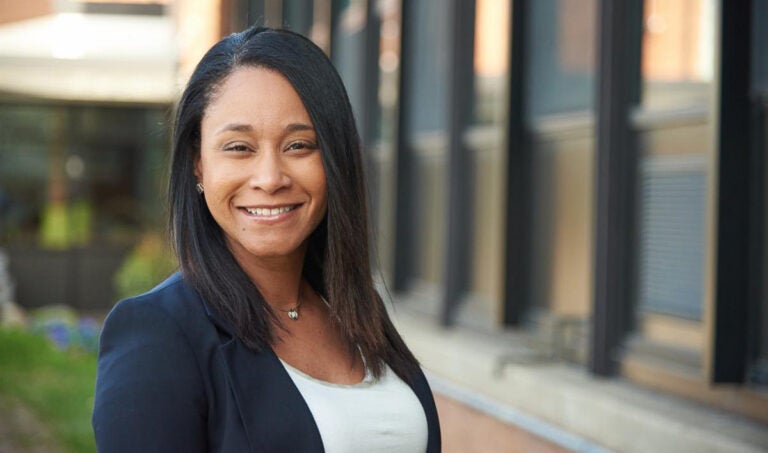
Jamila Winder, Democratic candidate for Montco commissioner.(provided)
Results are pouring in for Montgomery County’s commissioners race.
As of 11:33 p.m., with all of the 426 in-person precincts reported, Jamila Winder is in a strong lead with 53,741 votes. Winder was the only candidate endorsed by the Montgomery County Democratic Committee.
Democrat Neil Makhija is in second with 37,805 votes. The top two highest performers will run in November’s election for two possible seats on the county commission.
Makhija made a cautiously celebratory speech at his election night watch party in Narberth to a crowd of about 20 people still waiting for results.
“So everything we did, everything you did, was extremely helpful and made this possible,” he said.
Makhija said he is becoming “increasingly confident,” and that he believes results will fall in his favor by morning.
Winder’s running mate Kimberly Koch is coming in third with 30,489 votes. Tanya Bamford follows with 23,997, then Noah Marlier with 16,837.
For Republicans, Tom DiBello is leading with 30,868 votes. His running mate Liz Ferry is coming in a tight second with 28,522 votes. Sole incumbent Joe Gale is falling behind with 20,962 votes. Two Republicans will move on to November’s general election. Ferry and DiBello said they hope to take the majority back from the now Democrat controlled commission.
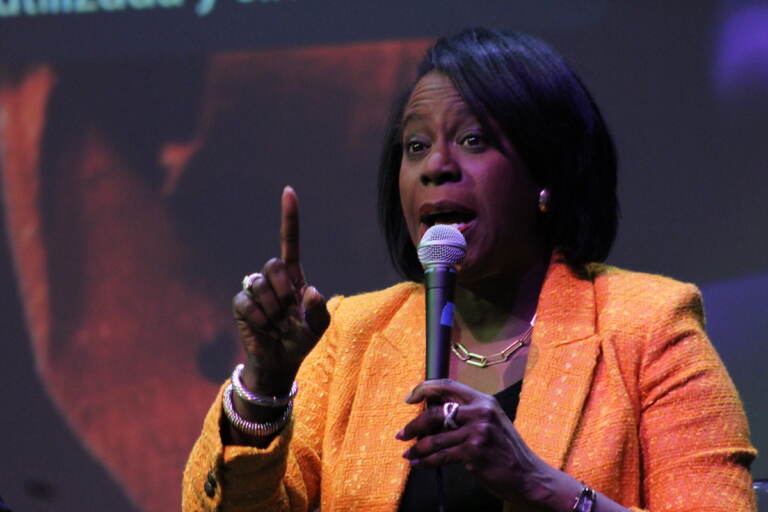
Former Councilmember Cherelle Parker says art has to be a vital part of education if it's to be implemented throughout the city. (Cory Sharber/WHYY)
Cherelle Parker, the lone Black woman in Philadelphia’s crowded mayoral race, made history late Tuesday after besting eight other Democratic candidates in what was expected to be a razor-thin primary.
The winner of the Democratic primary is expected to easily win an easy victory in November’s general election — putting Parker on track to be the first woman elected to the office.
» MORE: Cherelle Parker makes history with Philly mayoral primary win
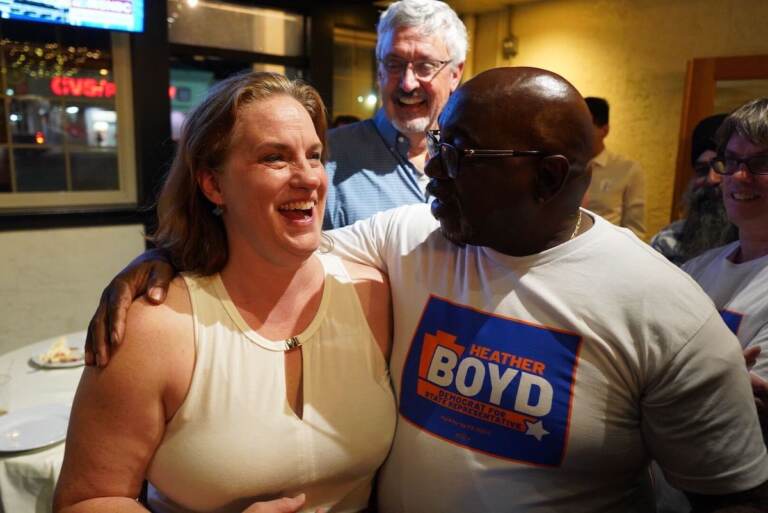
Boyd hugging supporters at Election 2023 watch party. (Kenny Cooper)
Democrat Heather Boyd has defeated Republican Katie Ford in the pivotal special election for a Pennsylvania state House seat in Delaware County, giving Democrats a narrow majority over the chamber once more.
Boyd, 46, campaigned on a platform of addressing public education funding, protecting abortion rights, and tackling racial disparities in maternal health.
Her win ensures that the Pennsylvania GOP has no path to restricting abortion via an amendment to the state constitution.
“Oh my god amazing, I’m just super excited obviously,” Boyd told WHYY News. “I never feel super confident walking into a race. You never know. The voters have to do what the voters have to do. And I’m so thankful to them.”
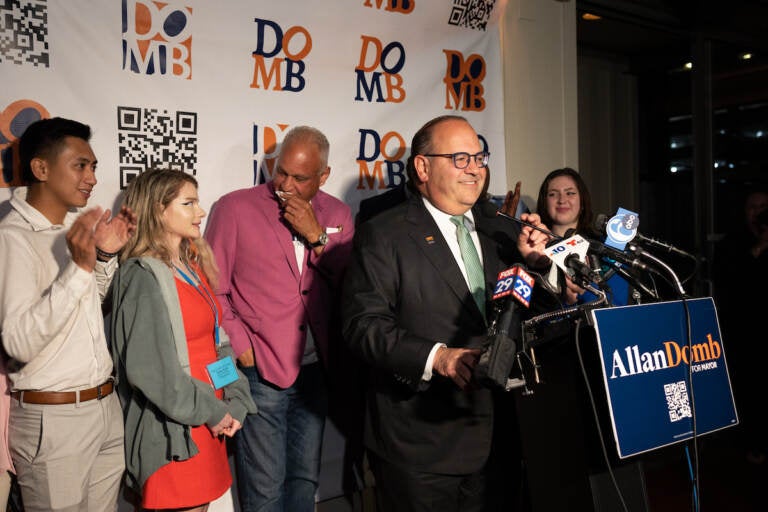
Allan Domb addresses supporters at his campaign party at the Continental Midtown on the night of the primary election (Becca Haydu/WHYY)
Cheers erupted at mayoral candidate Allan Domb’s election watch party in Center City as he made his first appearance of the night.
“I’m hopeful,” he told reporters. Early results show him trailing three other candidates.
“We did everything we possibly could,” Domb said. “This race is all about leadership, and I believe I can provide that leadership.”
While on Council, Domb led the effort to allow low-income Philadelphians to apply for a wage tax refund, pushed for business tax cuts, and sponsored the legislation that made expanded outdoor seating at restaurants during the pandemic, known as streeteries, permanent in some areas.
Jason Daniel Evans, who manages supplier diversity for TD Bank, worked with Domb when he was on City Council, and Evans was working at a bar. Domb helped the bar secure an outdoor dining permit, Evans said, and put people back to work.
“Allan made his entire office available to us,” Evans said at Domb’s election watch party Tuesday. “They helped us cut through all the red tape.”
Evans said Domb supports the LGBTQ community, and was the only member of City Council to attend a suicide prevention fundraiser Evans organized in 2019.
“Allan shows up,” Evans said.
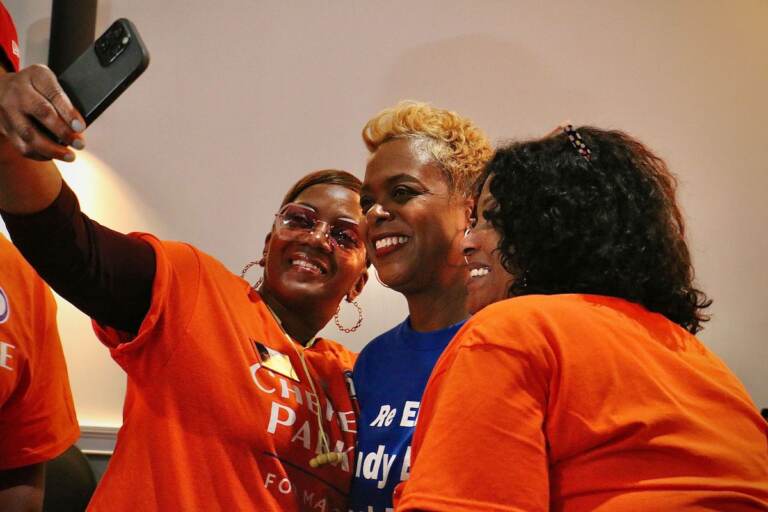
Philadelphia City Councilmember Cindy Bass takes a selfie with supporters at Cherelle Parker’s election watch party. (Emma Lee/WHYY)
A crowd of Parker supporters began dancing and cheering at the Laborers Local 332 union hall after the Parker campaign declared her winner. But minutes later, a campaign staffer took the mic to say the report of her victory was premature.
Parker leads the pack with 41% of the vote tallied. She’s ahead of Rebecca Rhynhart by 11 points, while Helen Gym trails in third place, 17 points behind Parker.
Parker is pulling ahead of the crowded slate and if she wins, she would be both the first woman and first Black woman mayor of Philadelphia.

Former Councilmember Cherelle Parker says art has to be a vital part of education if it's to be implemented throughout the city. (Cory Sharber/WHYY)
A tight race to lead the nation’s sixth-largest city was unfolding in Philadelphia on Tuesday as voters navigated a crowded field of Democratic candidates in a contest that centered on how to combat gun violence and quality-of-life issues that make people feel unsafe.
Former city council member Cherelle Parker and former city controller Rebecca Rhynhart were in a close contest as early votes were counted. The city was just beginning to count in-person ballots that were cast on Tuesday, which could sway the results.
The Philadelphia race serves as the latest barometer of how residents of some of the nation’s largest cities hope to emerge from the pandemic, which heightened concerns about crime, poverty and inequality. The results have sometimes been tumultuous in other parts of the country, leading to the defeat of the incumbent mayor of Chicago in February and the ouster of San Francisco’s district attorney last year.
Philadelphia voters will choose between front-runner candidates including former council members Allan Domb, Helen Gym and Parker; Rhynhart; and political outsider and grocer Jeff Brown. They are vying to replace Democratic Mayor Jim Kenney, who is term-limited.
Only one Republican, former city council member David Oh, is running. He and the Democratic nominee will face each other in the Nov. 7 general election. Because Philadelphia is heavily Democratic, it is likely that whoever wins the primary will become the next mayor.
The candidates have pledged to tackle the city’s violence and crime, and address the rampant quality-of-life issues, but how they plan to get there varies. The candidate who is able to muster their base and appeal to the widest cross-section of voters will ultimately tip the scales in a tight contest.
Jamie DeAngelis cast her ballot for Helen Gym after taking an online quiz and matching with her platform the most. She said it was difficult with so many in the race, and she predicts anyone who takes the helm of the city will face tough headwinds.
“Especially with the way the Democratic Party is a little bit fractured this time around, I just think that there’s going to be a lot of pushback on whomever gets voted in,” she said.
James Perelman had narrowed down his mayoral candidates to Gym, Parker and Rhynhart, ultimately casting his ballot for Rhynhart. He described her as having the plans that best match his concerns, particularly what he sees as a need to address gun violence and improve the city’s public schools. He also felt her background suited her for handling any potential economic downturns.
“But it was still difficult,” he said. “I think myself and I think a lot of Philadelphians feel like … maybe it’s time to consider ranked choice voting or something where we’re not having such a small percentage of the city deciding who’s mayor.”
Voters on Tuesday will also elect seven out of more than 30 total Democratic and Republican candidates for city council-at-large seats and three contested district seats.
To the west, voters in Allegheny County, which encompasses the state’s second largest city of Pittsburgh, will choose among six Democratic candidates vying to replace the county’s top official, who is term-limited. The winner will face a lone Republican contender in the November general election. Unlike in the Philadelphia mayor’s race, the primary winner will not necessarily be the person most likely to fill the county executive’s seat.
__
Associated Press video journalist Tassanee Vejpongsa in Philadelphia contributed to this report.
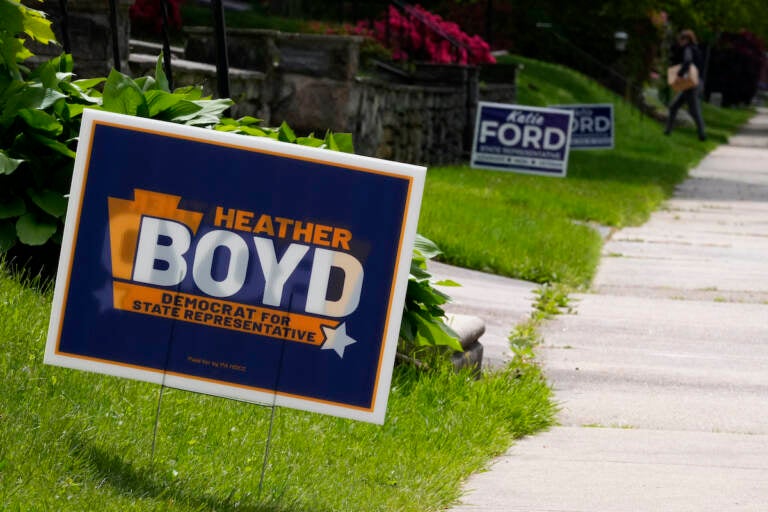
Campaign signs for Heather Boyd and Katie Ford are seen, Thursday, May 4, 2023, in Aldan, Pa. The two are running in a special election in the Philadelphia suburbs that will determine whether Democrats in the Pennsylvania House of Representatives will maintain control of the chamber or if Republicans will reclaim the majority control they held for 12 years until this January. (AP Photo/Matt Slocum)
Republican Michael Stender on Tuesday won a special election for a vacant central Pennsylvania seat in the state House of Representatives, a GOP hold that means majority control of the chamber will be decided by a second special election, in the Philadelphia suburbs.
Stender, a Shikellamy school board member, firefighter and former EMT, was endorsed by former Rep. Lynda Schlegel Culver, the Republican who represented the district before winning a state Senate special election earlier this year. Stender beat Democrat Trevor Finn, a Montour County commissioner. The district also includes part of Northumberland County.
Stender’s win gives Republicans 101 seats, one less than the minimum needed to control the agenda in the 203-member House chamber. The Associated Press has not called the second special election, in Delaware County.
If Republicans retake the House, freshman Democratic Gov. Josh Shapiro will have no chamber to aid his agenda going into the final month of budget negotiations. The state Senate is firmly in Republican control.
A Republican House could also vote to put a proposed constitutional amendment limiting abortion rights before voters as a referendum.
Republicans entered the 2022 election with a 113-90 advantage in the state House, but Democrats flipped a net of 12 seats in November, barely enough to claim majority status and elect one of their own as speaker. They held that majority by sweeping three special elections held in February.
___
Associated Press writers Nicholas Riccardi in Denver and Marc Levy in Harrisburg contributed to this report.
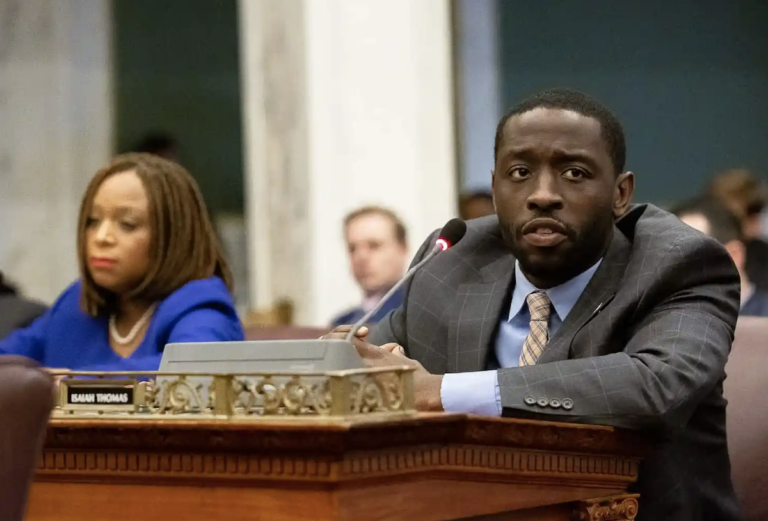
Councilmember Isaiah Thomas (City Council Flickr)
All three City Council at-large incumbents currently sit among the top five vote getters in the Democratic primary as votes start getting counted.
As of 9 p.m., Isaiah Thomas and Katherine Gilmore Richardson are currently leading. Jim Harrity is currently fifth.
Thomas won his seat in 2019 on his third attempt. He chairs the Streets Committee and is vice chair of the Children and Youth Committee.
Richardson became the youngest woman elected to citywide office and the youngest Black woman ever elected to City Council when she won in 2019.
Harrity was elected to City Council in November after winning a special election to replace Allan Domb, who resigned to run for mayor.
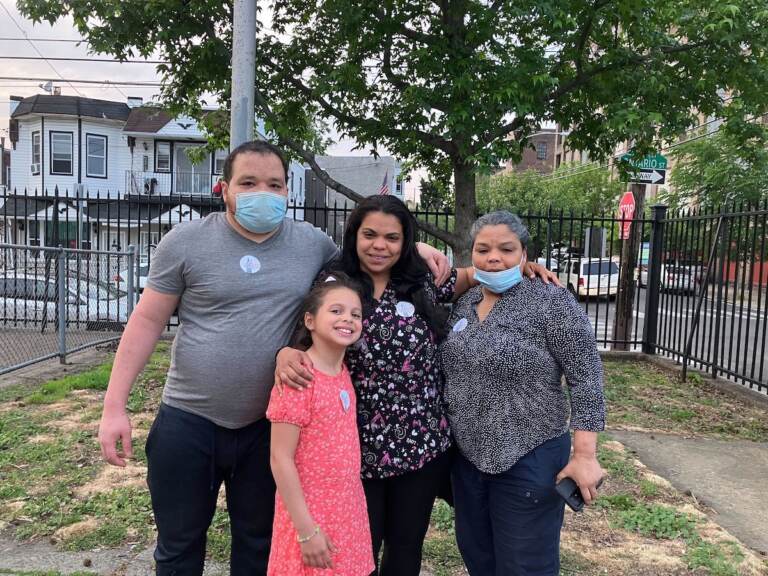
Elias Montijo, Vanessa Torres, Roz Lopez and Lydia Meson (8) have a family tradition of voting together. (Sammy Caiola/WHYY)
McVeigh Recreation Center in Kensington welcomed just a few voters in the 7 p.m. hour as Philly’s primary Election Day came to a close.
Many of the neighborhood’s voters are Spanish speakers, according to poll workers. They had checked in about 50 people by the end of the day.
The District 7 City Council race is between Quetcy Lozada, who took the seat in a November special election after former Councilmember Maria Quiñones Sánchez stepped down to run for mayor, and challenger Andrés Celin.
Quetcy is former chief of staff to Quiñones Sánchez and a former vice president of Esperanza Health Center. She has said she wants to increase mobile mental health response teams.
Celin is a former family case manager with Congreso de Latinos Unidos who wants to focus on affordable housing and illegal dumping.
Resident Roz Lopez arrived to vote with her daughter and granddaughter. She said she feels Quinoñes Sánchez let Kensington residents down by not addressing the open-air drug markets in the neighborhood, and she worries Lozada will continue that inaction.
“Quiñones was present, but fell short of the follow-up, and I’m not about that,” Lopez said.
She said she hopes the new District 7 council member will say no to supervised injection sites.
“It continues to enable a bad behavior,” she said, emphasizing the need for recovery homes instead.
Lizette Carasquillo is a 22-year Kensington resident who was handing out sample ballots for the Democratic City Committee, which supports Lozada. She said she wants the next District 7 council member to take care of trash and drug use in the neighborhood.
“People do what they want here, they don’t care,” she said. “It’s better to be inside … we have to take my grandkids on a long drive to go to the park.”
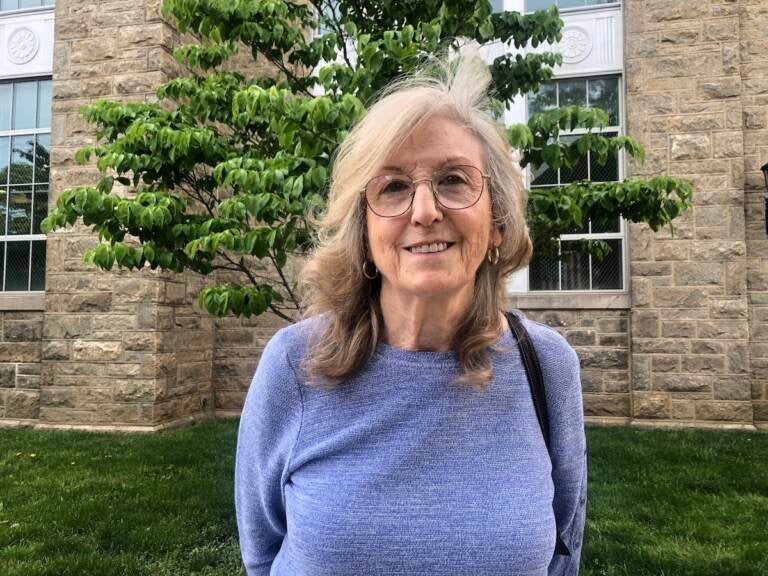
Patricia Leonard, 80, is a Republican from Ardmore who said she had a hard time deciding who to vote for for Montgomery County commissioner. (Emily Rizzo/WHYY)
During the final hours of voting, Lower Merion voters were slowly dripping into the polling location at Lower Merion High School in Ardmore. Democrat and Republican poll workers there said the whole day was slow.
Some voters still trickled in between 5:30 and 6:30 p.m.; most were regular voters.
Patricia Leonard, 80, is a Republican from Ardmore who said she had a hard time deciding, partly because she said her television was full of commercials for Philadelphia mayoral candidates.
She ended up voting for the two candidates who were endorsed by the Montgomery County Republican Committee — Liz Ferry and Tom DiBello. They are running mates vying for the two possible spots against incumbent Joe Gale. The two highest vote-getters will move on to the November election. Three seats are open on the commission, and Ferry and DiBello hope to take the majority back.
Leonard says her main concern is crime rising in Montgomery County. “I’m probably in the minority around here being a Republican party, but I don’t care,” Leonard said. “We all have a responsibility to follow our own opinions.”
Lower Merion is majority blue. And Democratic voters have a tough decision with five candidates on the ballot for commissioner.
Michele Broder, 60, and Helen Aster, 62, are Democrats from Ardmore. They both said they weren’t swayed by the Montgomery County Democratic Committee’s endorsement. The party endorsed Jamila Winder, and left the other seat as an “open primary.”
“I’m not swayed as much as I was as a kid, when an organization says, ‘check this lever.’ I just think you should do a little research,” Aster said.
Broder and Aster both voted for Democrats Neil Makhija and Noah Marlier.
Aster said she felt Makhija “had really amazing credentials,” that he cared, and that he was “going to make a difference.”
Aster and Broder said they couldn’t find a lot of information online when they Googled the candidates, and relied on their informed neighbors to help make a decision.
“Truth of the matter is, we’ve lived here long enough, we know these people at the polls … they’re neighbors, they’re friends, we chat,” Broder said.
Pat Worrell, Democratic candidate for Chester mayor, wants voters to ‘do their homework’ before they cast a ballot
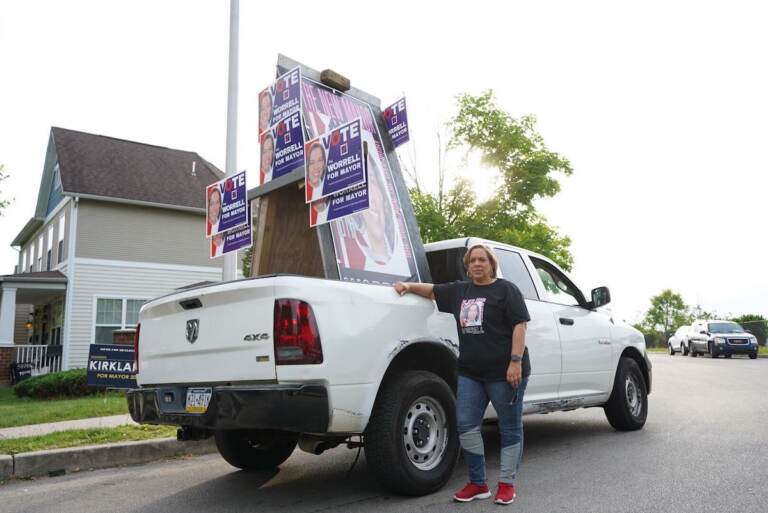
Pat Worrell, Chester mayoral candidate, poses for a photo. (Kenny Cooper/WHYY News)
Pat Worrell, Democratic candidate for mayor in the city of Chester, said she’s feeling great about her prospects to unseat incumbent Thaddeus Kirkland.
“We had some good turnout today. I ran around to all the polls today and I got some good feedback from the voters,” Worrell said.
Worrell, a real estate broker, said most of the voters that she has talked to have already made up their minds. But that hasn’t stop her from making her final plea to voters. She wants them to “do their homework.”
“[I want them] to make sure that they are aware and understand who they’re voting for before they vote,” Worrell said.
Like fellow Democratic challenger Stefan Roots, Worrell has centered the city’s path to a financial recovery in her campaign.
And like Roots, Worrell was using a car —and a lot of noise to get voters’ attention and drum up enthusiasm.
Michael Collier, a retired member of local union 413, has been a poll watcher for almost 50 years.
“It seems like it’s pretty good turnout today. Very good turnout,” Collier said.
He said he expects to see another surge of voters as people get off of work.
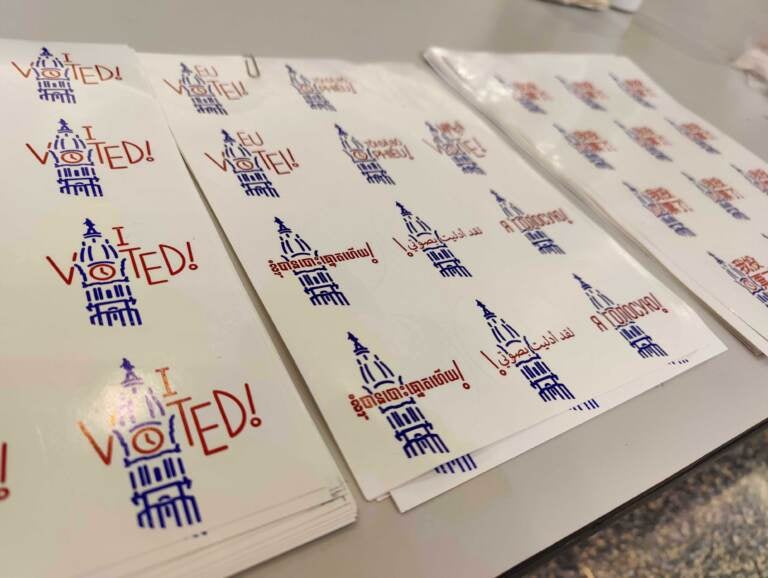
'I Voted!' stickers waiting for voters on primary election day in Philadelphia on May 16, 2023. (Peter Crimmins/WHYY)
Polls have closed in Pennsylvania for the 2023 primary election.
And all eyes are on Philly’s crowded mayoral race, along with all 17 City Council seats and a Delco special election that could shift the balance of power in the state House.
Follow along with live results as they come in: Pennsylvania | Philadelphia
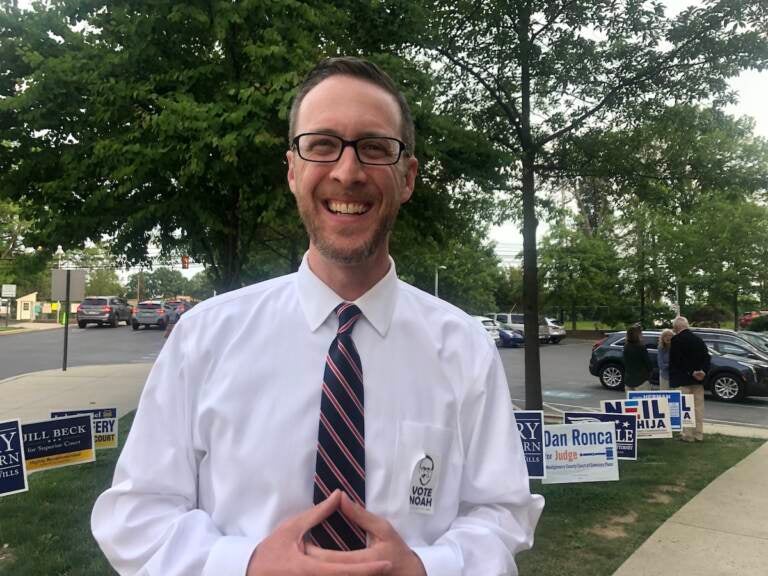
Montgomery County commissioner candidate Noah Marlier at a polling location on May 16, 2023. (Emily Rizzo/WHYY News)
It’s a packed race for Montgomery County commissioner, and candidate Noah Marlier has been traveling across the county vying for votes.
Marlier is one of the five Democrats running. The Montgomery County Democratic Committee only endorsed one candidate, Jamila Winder, leaving more opportunities for challengers. The result was the most crowded race for Democrats since the party took control of county government in 2012.
Marlier was still talking to voters at 6:30 p.m. outside Lower Merion High School in Ardmore before polls close at 8 p.m. One voter walked by on his way into the building saying, “You’ve already got my vote.”
“I’m confident that in a few hours we’re going to have some positive results for me,” Marlier said.
He said he’s encouraged after meeting with Democratic committee people who are behind him throughout the county.
“They know that I care about progressive values, they’ve seen it. I’ve demonstrated it at the county level,” Marlier said.
Marlier is the county’s prothonotary and believes his experience working as an elected official will get him far in the race. He was also a Montgomery County district attorney and a municipal attorney for several Montgomery County municipalities.
He said at the voting locations he visited, there was a low turnout. That was true for the Ardmore location too — where a very slow dribble of voters came by between 5 and 6:30 p.m.
No matter what happens tonight, Marlier is also running as the uncontested candidate for county prothonotary.
“I will still be a county elected official and I think as a leader in the Democratic party… [Our party] needs leadership that is compassionate… that cares about good government first and foremost.”
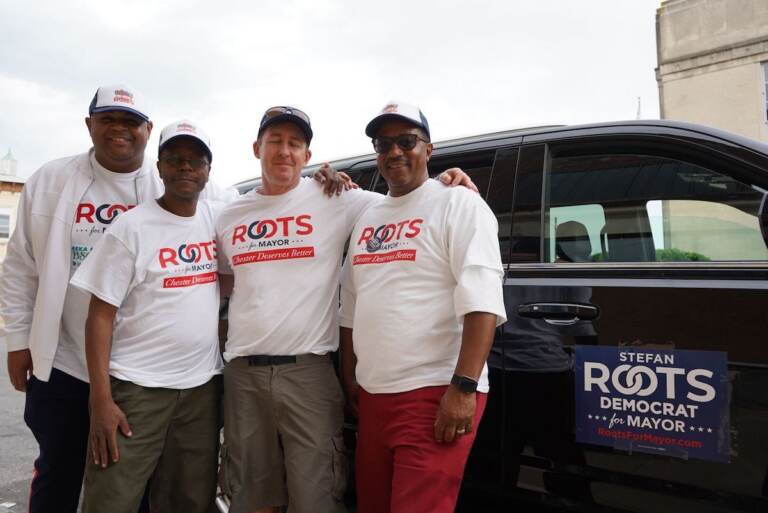
Stefan Roots poses with campaign members. (Kenny Cooper/WHYY News)
Chester’s mayoral race is a three-person competition, but Democratic challenger Stefan Roots said he’s confident that he will unseat incumbent Mayor Thaddeus Kirkland.
“I feel wonderful. We came in this to win it. We don’t do a formal exit poll, but if the informal exit polls are people coming out of the polls and just saying, ‘I voted for you,’ I’m getting pretty much 100% feedback from people,” Root said.
Roots, a first-term council member, said his team has been in their cars making noise with a bullhorn to get the public’s attention and let them know to vote.
He said the car his team is using, decorated in “Roots for Mayor” stickers, is a part of his campaign strategy in what he believes is a competitive race.
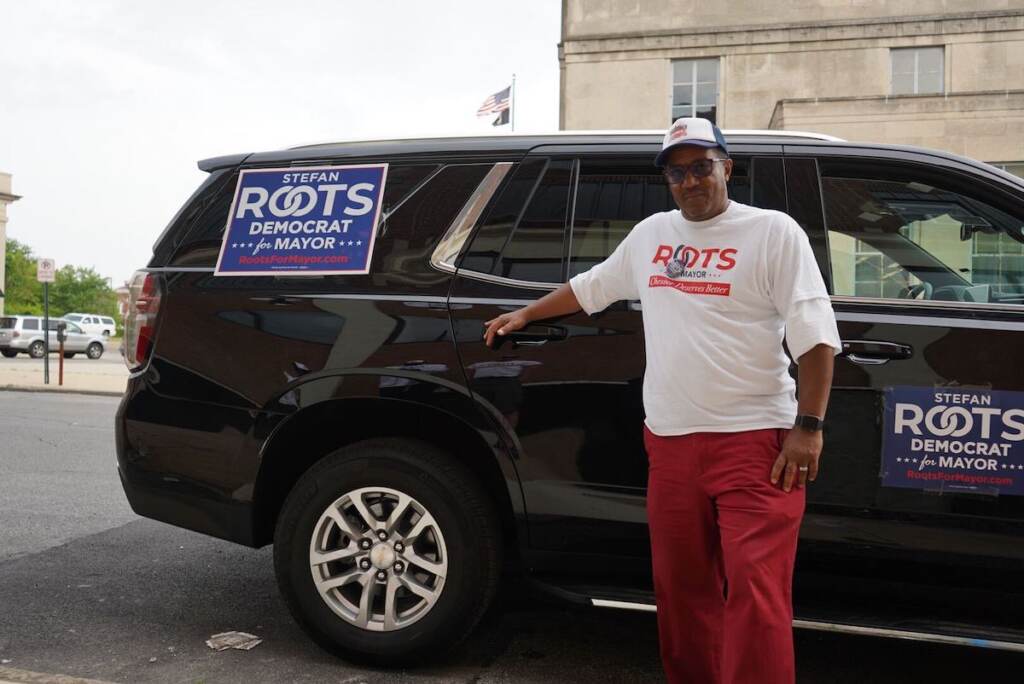
“We like to have the flash. We like to make the noise. We like to make people aware that there is an election going on,” Roots said.
He said in a city that usually draws pretty low turnout, it’s important to have “the splash, the bang, the boom.”
According to Roots, however, voters in Chester have requested more mail ballots at rates higher than their neighboring communities this cycle.
“People don’t request a large increase in mail-in votes to maintain the status quo,” Roots said.
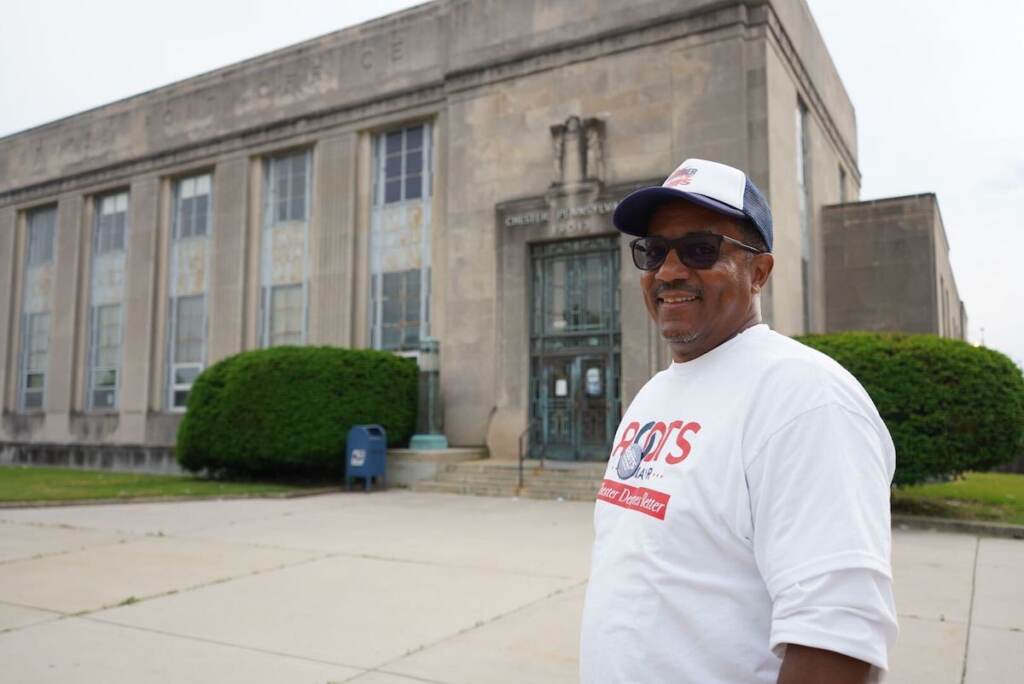
Roots campaigned on turning the bankrupt city’s poor financial future around.
He’s hoping for a decisive win and massive turnout when all is said and done.
“This is a stake election. We want people to know that this win makes a big difference in what goes on in the city of Chester,” Roots said.

'I Voted!' stickers waiting for voters on primary election day in Philadelphia on May 16, 2023. (Peter Crimmins/WHYY)
Philadelphia Ward 1 leader Kathleen Melville said that voter turnout before the usual rush between 5 p.m. and 7 p.m. has been strong.
Poll book tablets have been functioning properly so far, and there’s no long lines for voters.
As of 5:10 p.m., there were roughly 2,500 in-person votes in Ward 1 in addition to 729 mail-in ballots returned, according to Sixty-Six Wards, a blog for data-based analysis of Philadelphia elections.
By comparison, turnout in 2019 for Ward 1 was 3,689 voters.
“It’s a little bit hard to tell just because voting patterns have changed a lot since the pandemic, both because a lot of folks are mailing in their ballots, but also because a lot of folks are working at home,” Melville said. “So we don’t see as much of like the peaks in the morning and in the evening.”
Her organization has knocked on 7,000 doors across South Philly and had dozens of conversations with voters.
“I think that that really impacts turnout significantly,” Melville said.
The polling location is on track to beat 2019 voter turnout, she said.
“I think that it’s very possible,” she said.
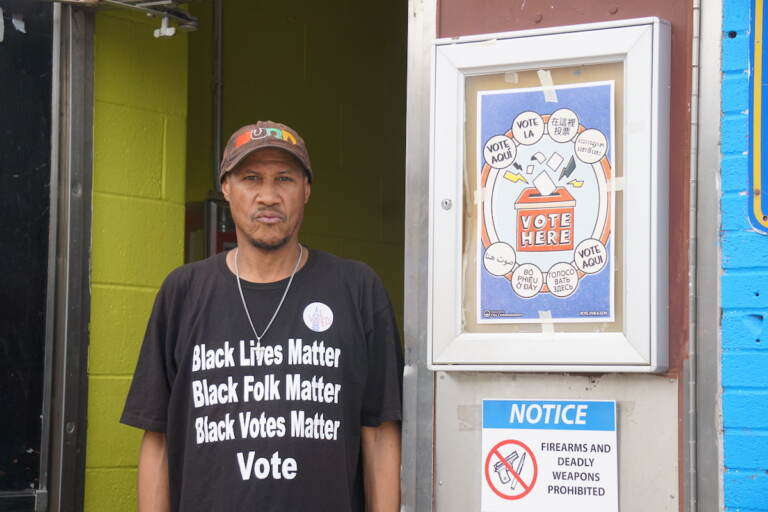
Anthony C. Jones, a committee person for the 46th Ward's 14th division, stands at the entrance to Christy Recreation Center. He wears one of the t-shirts made for the 46th Ward. "It says Black lives matter, Black folks matter, Black votes matter. We just want everybody to come out and vote," he said. (Sam Searles/WHYY)
Anthony C. Jones sat outside of the Christy Recreation Center handing out literature. He wore a black t-shirt with the phrase “Black lives matter, Black folks matter, Black votes matter” printed on the front.
He gestured to fellow poll worker Lloyd Carpenter when asked about the shirt. “He’s the originator of the shirt,” Jones said, pointing. “He made this up for everybody in the 46 ward, divisions 46, 1246, 1346, 14, which is me, 4615, 4620, and 4621.”
The idea for the shirt came to Carpenter eight years ago. “I bought a bunch of t-shirts, gave them to the committee… we’ve been rocking that ever since because Black people need to come out and vote.”
As a former gang member who worked to ease tensions among gangs in the ‘70s, Carpenter said he sees economic development as a path to a safer city and is voting for Jeff Brown after he received an endorsement from former City Councilmember Jannie Blackwell.
“[In the ‘70s] we were always working together to stop the gang wars and all that. But then when we did that for the city, we had nothing to offer [former gang members]. We want them to go to trade schools, go back to school, get a job — but the city just [said] ‘No, just stop the gang war.’”
Carpenter said he believes Brown will be able to organize the city to combat violence.
“I believe in organization, you got to have organization and you got to have soldiers that’s willing to fight the war.”
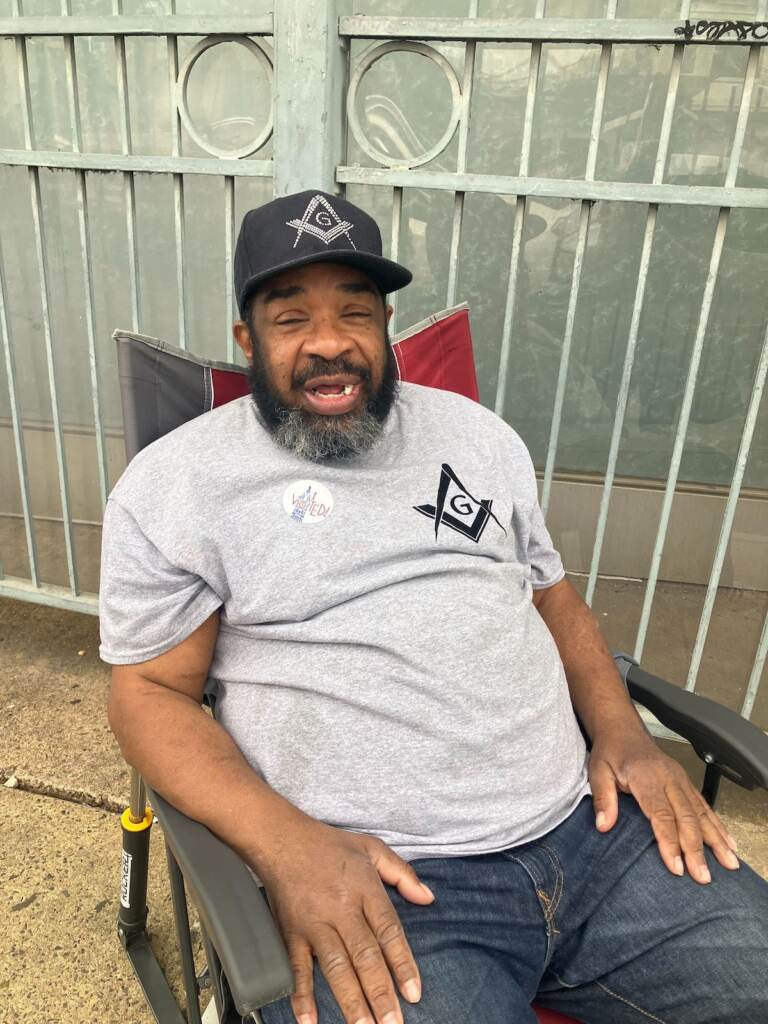
Kirk Battle, 62, said he voted for Seth Anderson-Oberman over incumbent Cindy Bass in the District 8 City Council race because he wants to see a fresh take on public safety. (Sammy Caiola/WHYY)
At Nicetown-Tioga Library in Philadelphia’s 8th City Council district, poll workers say they’re handling a slow but steady trickle of voters. They expect to assist a total of 70 people before polls close at 8 p.m.
City council incumbent Cindy Bass is facing a challenge from newcomer Seth Anderson-Oberman.
Voter and poll worker Kirk Battle, 62, said he wants to see a fresh perspective on public safety.
“(Bass) was doing alright. I ain’t gonna say it’s been great but she’s doing alright,” he said.
He said if Anderson-Oberman is elected, he’s hopeful there will be positive changes to the neighborhood, such as more activities and spaces for youth.
“The new person seems to have better ideas, and I want to see if they can pull it off or if it’s just all talk,” he said.
Denene Dancey went to Stenson Park Recreation Center to vote for Cindy Bass.
“I like that she’s for the community, she does a lot of things to uplift the community,” said Dancey, who has lived in the neighborhood since 1976. “She tries to protect the community. I think she should stay.”
Resident Milton Briggs said he didn’t know anything about the council race, but wanted to show up to cast a vote for the next mayor.
“My people struggled for so long to vote, why wouldn’t I want to vote?” said Briggs, who is Black. “I think it’s the right thing to do.”
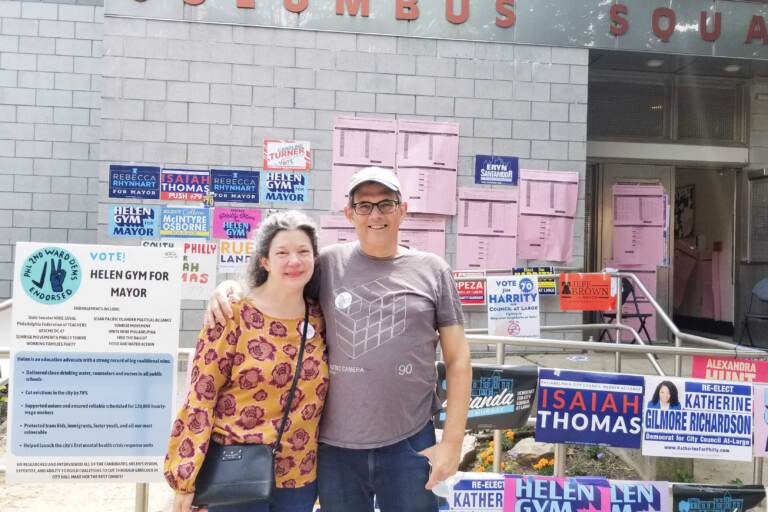
Rose Drew and Tom Leonard voted in the primary election Tuesday at the Columbus Square Recreation Center in South Philly. (Nicole Leonard/WHYY)
Big polling sites like the Palumbo and Columbus Square recreation centers saw steady foot traffic from South Philadelphia voters Tuesday afternoon as residents cast their ballots for mayor, City Council, and other primary races.
Funding for Philadelphia public schools was top of mind for Steve Manobianco.
“I think that the charter school system is giving sort of uneven gains for certain citizens in the city,” he said. “And I’d like to see it be a little bit more equitable for everyone.”
Manobianco was at the polls with his wife, Megan Manobianco.
“I think Philly is in some ways kind of like a role model for other cities, too,” she said. “So I think it’s really important that we vote for that change.”
Crime and safety were common concerns among voters.
Tom Leonard and Rose Drew are both native Philadelphians.
“We need someone who’s way tougher on crime than we have currently,” Drew said.
Leonard said that’s one reason his vote went to Cherelle Parker, who he believes will be the “toughest on crime.”
“And she also has vast knowledge of the political system in Philadelphia,” he said. “She’ll be able to negotiate it in a way that somebody who doesn’t have that knowledge would be able to.”
Sarah Eisenstein said she thinks the race for mayor is a competitive one, but added that it’s not a bad thing.
She was voting in South Philly with her husband, Leo Eisnstein, and their 19-year-old daughter, Isabella Eisenstein.
“I think this is the first time in a while that we had a bunch of candidates that you were choosing, ‘which one do you like the best,’ not ‘which one do you [dislike] the least?’ So, that was really nice.”
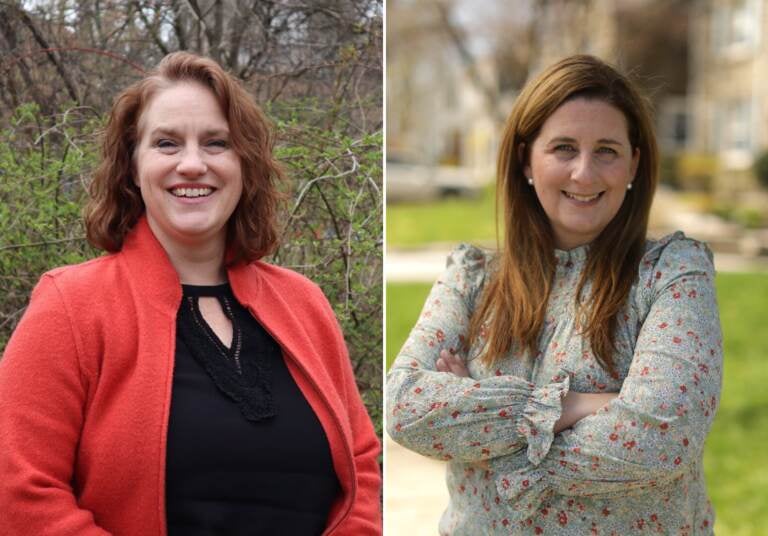
Heather Boyd (left) and Katie Ford. (Courtesy of the Boyd and Ford campaigns)
A special election in Delaware County has captured the attention of political onlookers across the Commonwealth.
Voters in Pennsylvania’s 163rd state House district — which spans Aldan, Clifton Heights, Collingdale, and parts of both Darby Township and Upper Darby — have to fill a vacancy 16 to determine the balance of power in the chamber.
For the first time since 2010, Democrats seized control of the state house in November with several crucial victories in the increasingly blue suburbs of Philadelphia.
Democrats clutched onto power in the house through a one-seat margin. However, the party soon lost control of a House seat in Delco. Former Democratic state Rep. Mike Zabel held the seat for four years before resigning in March due to sexual harassment allegations.
With the scale in the state House dead-even, big names and even bigger sums of money are looking to leave their mark on the race between Democratic candidate Heather Boyd and Republican candidate Katie Ford.
» MORE: Read Kenny Cooper’s full story.

Andrea Clark said she's concerned for her children and grandchildren's safety, and wants more outlets for Philly's young people. (Sam Searles/WHYY)
Inside the Lamberton Little School House, poll worker Jonathan Jefferson kept a close eye on voter turnout.
“I’ll vote when we hit 100 [voters],” he said, smiling. A retired veteran, Jefferson has been facilitating Philadelphia elections for the past two years. He thinks most races will be close.
“From what I saw, everything looked like it was tied as far as the percentages. So I try to tell my neighbors, I can’t force anybody — but it’s so close that we all have to come in and be a part of what we need to do because say, 30 or 40 people don’t vote, that could turn the tide from one to the other, just like that, because it’s so close.”
After completing her ballot, Andrea Clark, who is pursuing a master’s degree in public health, said that her main voting priority is public safety. She said the pattern of increased violence in the wake of the pandemic is troubling.
“I know before we had gun violence and all that, but now it’s more prevalent,” she said. “We’re just putting a Band-Aid on everything: ‘Oh, yeah, you know, the kids are crazy [and] out there shooting’ — what happened?”
Clark also said she wants to see more programs for young people and better rehabilitative services for people who were recently incarcerated.
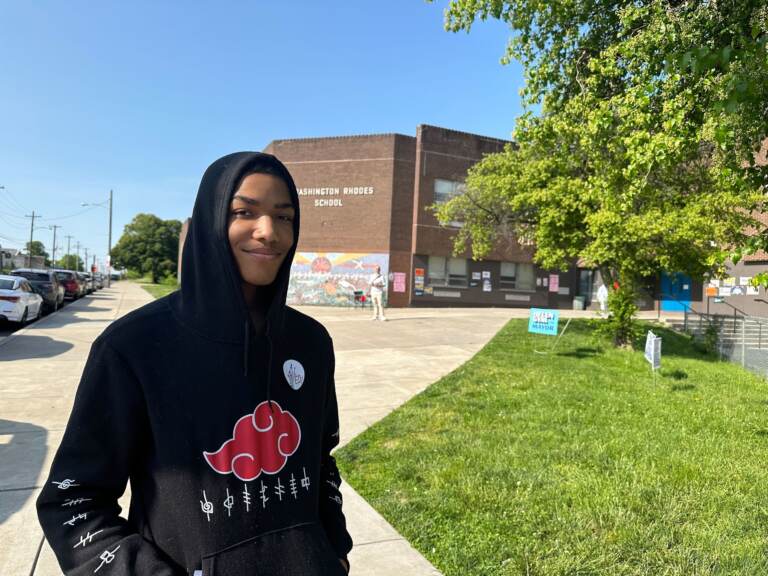
Amir Cooper, a 21-year-old resident in North Philly, says he voted today because he wants to see change in his community. In particular, he wants to see the next mayor tackle gun violence.
Several polling locations in the Allegheny West neighborhood in North Philly had a slow but steady stream of voters casting ballots on Tuesday morning.
The Smart Center Daycare along Westmoreland Street was converted into a polling location where supporters of Cherelle Parker handed out sample ballots to voters trickling in. There was no line of voters just before 8 a.m. at the polling site.
The new electronic tablets and mobile applications used instead of the printed voting books worked smoothly at the small polling location.
Outside E. W. Rhodes Elementary School nearby there was a steady stream of voters on Tuesday morning, mostly seniors. Supporters of Helen Gym were handing out sample ballots to voters.
Amir Cooper, a 21-year-old resident in North Philly, said he voted because he wants to see change in his community. In particular, he wants to see the next mayor tackle gun violence.
This is his third time voting since he turned 18 years old. He encourages everyone to vote because elections can sway based on just one vote, he said.
“If you can vote you should. It can make a huge difference,” he said.
Cooper voted for Gym for Philly’s next mayor after taking a sample ballot from her supporters.
He said he’s not really into politics but said “there’s been a lot of problems” in his community he’d like the next mayor to tackle.
“I want people to step up and try to change that,” he said.

Polls are open on primary Election Day in Philadelphia, May 16, 2023. (Kimberly Paynter/WHYY)
By just before noon Tuesday, more than 71,000 voters had cast in-person ballots in Philly’s mayoral election. That’s according to unofficial estimates compiled by the blog sixtysixwards.com.
The crowd-sourced tracker asks voters to report what time they voted, at what precinct, and what number voter they were at that location. That estimate, combined with the more than 63,000 mail ballots that have been returned, would put the total number of votes cast so far at more than 130,000.
With a wide field of candidates and polling indicating a tight race among the top four candidates, city elections officials were expecting close to 300,000 votes to be cast.
The tracker, which debuted in 2018, was created by West Philadelphian Jonathan Tannen, a data scientist with a Ph.D. in urban planning. According to WHYY’s Billy Penn, Tannen uses historic trends in each division’s turnout to turn the data provided by voters into a surprisingly accurate picture of how many voters actually show up to cast a ballot.
For the last mayor’s primary contest in 2019, Sixty-Six Wards calculated that 230,000 to 275,000 people voted, which wasn’t too far away from the actual total of about 220,000.
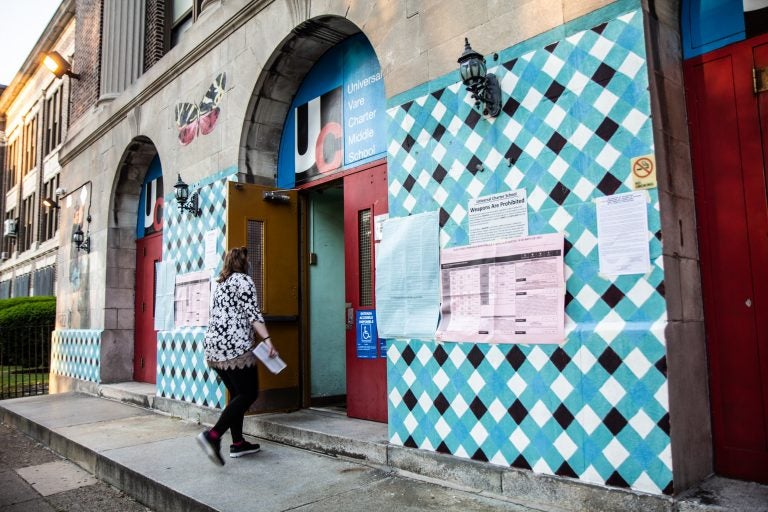
A voter enters a polling place at 23rd and Jackson streets in South Philadelphia on May 18, 2021. (Kimberly Paynter/WHYY)
In a tight race where a single-digit lead could determine the victor, Philadelphians may have a waiting game on their hands.
The head of the Philadelphia City Commissioners is not promising a mayoral primary winner will be determined before midnight on Election Day.
Omar Sabir said with over 90,000 mail ballots to count, election officials may not have enough processed to merge with the live ballots to determine a winner.
“We want to manage everyone’s expectations,” Sabir said, “But it all depends. If it’s a blowout, we might be able to declare a winner that night. But if it’s close, we may have to wait a little while.”
A blowout is not expected, with both internal and external polling pointing to a close contest. Sabir said any mechanical failure could also delay the count.
“God forbid, the machine breaks down. You know, we never know. But again, I can say that we do have the best election staff in our country,” he said. “And when all the bright lights are shined on Philadelphia for our elections, we get it done.”
Around 300,000 people are expected to vote in Philadelphia primary election, with about one-third of the vote coming from mail ballots.
Mail ballots must remain sealed until election day, a practice Sabir doesn’t want to continue. He is asking state officials to allow pre-canvassing, or counting the ballots before election day, to help officials bring results to voters once the polls close.
“If the legislature had pre-canvasing where we can begin the process and start opening up the ballots before Election Day, that would be a game changer,” Sabir said. “So any legislator that’s listening right now up in Harrisburg, let’s get it done. We need pre-canvassing.”
Even if a winner is declared on Election night, that isn’t the “official” tally. The canvas that reviews the voting begins later in the week, when all the machine cartridges and provisional ballots are brought to the city commissioners for review. Once the official canvas begins, provisional ballots can be challenged by candidates and knocked out. That process usually takes a week or more before the election is certified.

Philadelphia's ''I Voted'' stickers were designed by a local high schooler. (Danya Henninger/Billy Penn)
This story originally appeared on Billy Penn.
Did you cast a mail ballot for the May primary election?
Check the below list of names to make sure there isn’t a problem with what you sent in. If there is, you have a chance to fix it and make sure your vote counts.
The Office of City Commissioners recently released a list of nearly 1,400 Philadelphia voters whose mail ballots were received with errors. The issues include:
- No signature on the exterior envelope.
- No date on the exterior envelope.
- Potentially incorrect date on the envelope.
- No secrecy envelope (aka a “naked ballot.”)
More than 95,000 mail ballots were requested for this election in Philadelphia. As of Monday morning, 51% had been returned, per Department of State data.
Anyone on the lists below can still receive a replacement ballot at the County Board of Elections office in City Hall Room 140 today from 9 a.m. to 7:30 p.m.
Replacement ballots can be dropped off at one of the secure locations throughout the city, or right there at City Hall.
On the list but can’t get to the City Hall office in time due to a disability? You can authorize a designated agent to pick up and/or return your completed ballot.
On the list but can’t get a replacement using the instructions above? You can request a provisional ballot at your polling place on Election Day. Provisional ballots are the last to be counted.
Below is the list of ballots with errors, which is searchable by name.
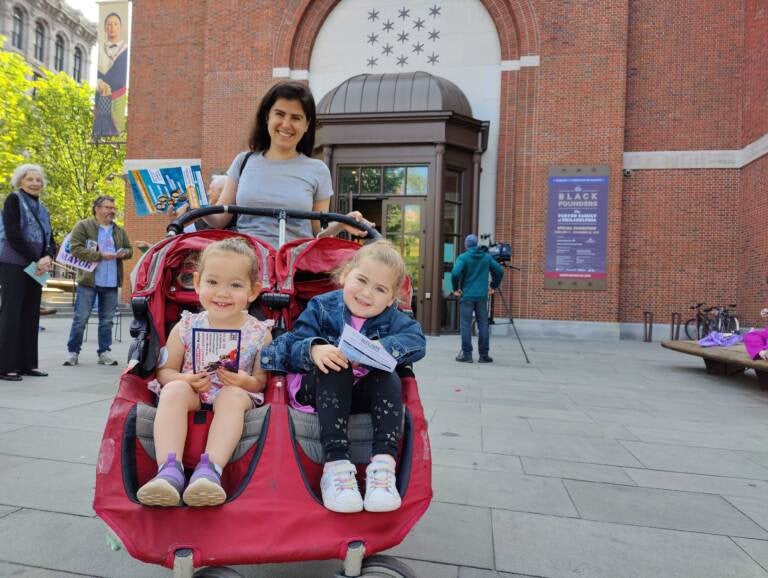
Julia Riskowitz brought her daughters Amelia and Madeline to vote. On her mind was public safety and schools. She wouldn't say who she voted for, but someone with "experience and a proven track record." On her daughters minds? "The stickers." (Peter Crimmins/WHYY)
Julia Riskowitz brought her daughters Amelia and Madeline to vote at the Museum of the American Revolution.
On her mind was public safety and schools. She wouldn’t say for whom she voted, but it was someone with “experience and a proven track record.”
On her daughters’ minds?
“The stickers,” Riskowitz said, as the kids played with the “I Voted” stickers they received.
Riskowitz was also motivated to vote down the ballot, for the judges who will fill one vacant seat in the Pennsylvania Supreme Court, and three seats in the state Commonwealth and Superior courts.
“Judicial elections are always important. As a lawyer, it’s something that impacts my career,” she said. “But the mayoral race was really what was most important.”
Peggy Carver, who described herself as “liberal but not too progressive,” also felt voting for judges was crucial.
“Having the right judges — it makes a big difference,” she said. “There are some that are good, some that have no business being on the ballot. But that’s our system: Everybody has a right to try.”
» RELATED: A complete guide to the candidates for state Supreme Court
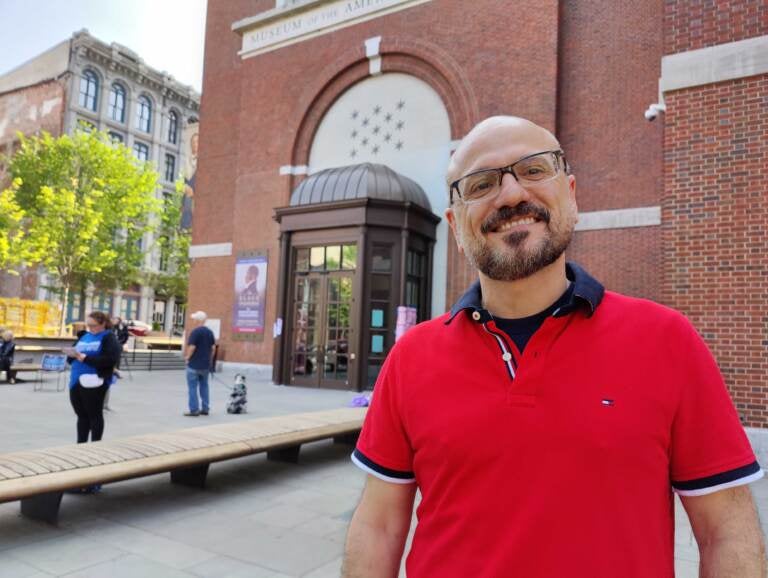
Joseph Mongelli voted with the city's economy on his mind. (Peter Crimmins/WHYY)
Voters are casting ballots Tuesday to decide a race that has no clear, runaway leader.
Recent polling shows a practical tie among the front-runners, all of them women: Helen Gym, Cherelle Parker, and Rebecca Rhynhart. Allan Domb was not far behind.
Voter Kate Nicholson was thinking about gun violence and homelessness, but had to parse candidates’ positions before making her decision.
“I like what Helen Gym says. I think she says the right things. I just don’t see her having plans to do anything, though,” she said. “I feel like Rebecca — she’s been entrenched in it and she’s been down and dirty in the minutiae of it. I feel like she could actually do things.”
Joseph Mongelli had the economy on his mind when he came to the polls, as well as the effort to recover from the pandemic slowdown.
“We need to get things revved up a little more,” he said.
Mongelli is also concerned about threats to LGBTQ and abortion rights. He said what clinched his decision for mayor was the endorsements for Rhynhart by three previous mayors.
“They struck a chord,” Mongelli said. “She will vote for the same issues, and go forward with the same issues. That’s the reason for my vote for her.”
» RELATED:
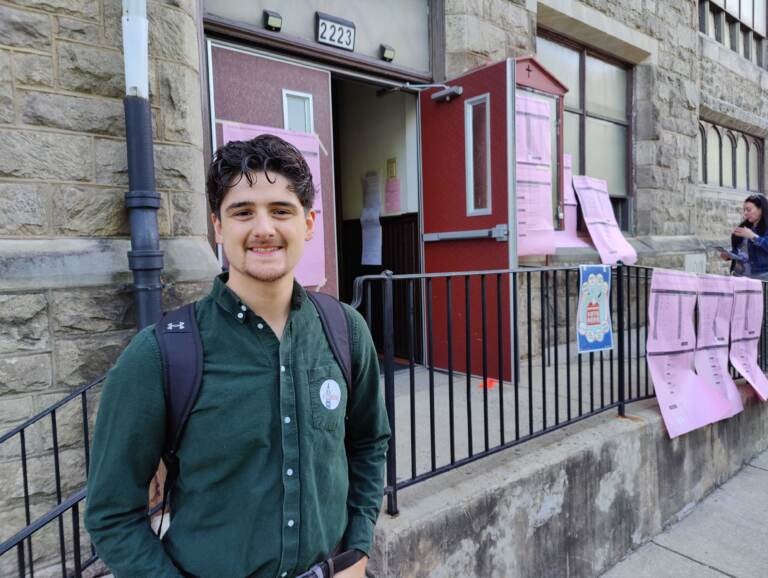
Today is the first day Adam Hoover is voting for a mayor. He's from a small town in Schuylkill County, and had to do some research into what a big city mayor does. 'Seems they do a lot more than I expected.' (Peter Crimmins/WHYY)
Today is Adam Hoover’s first time voting for a mayor, of any city.
The Fishtown resident moved from a small town in Schuylkill County nine years ago, and he was among the first at his polling place this morning to cast his ballot in Philadelphia.
At the top of his mind is public safety.
“I love it here,” Hoover said. “But I still feel unsafe sometimes.”
He prepared to vote by looking up what the job of a big-city mayor is.
“I wasn’t really sure what a mayor did, so I was doing a bunch of research,” he said. “It seems like they do a lot more than I expected.”
Hoover is not alone. The day before the election, WHYY’s Billy Penn published a description of the responsibilities and powers of the mayor’s office in plain language. The election watchdog group Committee of Seventy also offered voters a crash course in what the job of mayor entails.
“Coming from a smaller, rural area, local government seems less,” he said. “But now, in the city they have a lot of responsibility.”

On May 16, Towamencin residents vote on a new local law that forbids the privatization of its sewer system. (Towamencin NOPE)
Towamencin residents on Tuesday are voting on a new local law that forbids the privatization of its sewer system.
The small township in Montgomery County is one of the most recent in a wave of Pennsylvania communities battling privatization of public water and sewer systems. And they’re using an innovative approach.
In November’s election, residents voted to create a Government Study Commission. That commission wrote a new home rule charter, similar to a local constitution, that prohibits the sale of wastewater and stormwater systems.
Resident Kofi Osei, founder of Towamencin NOPE (the group leading the charge against privatization), is hoping the new charter will lead to the termination of the impending sale to Pennsylvania American Water. But according to Osei, township supervisors could decide to not comply. If that happens, he said residents could sue the township and a judge would be left to decide if the township has to comply with the charter.
Osei says he’s optimistic that the charter will pass “as long as people show up.”
If it does, he hopes that it “sends a message across the Commonwealth that privatization isn’t a good thing.”
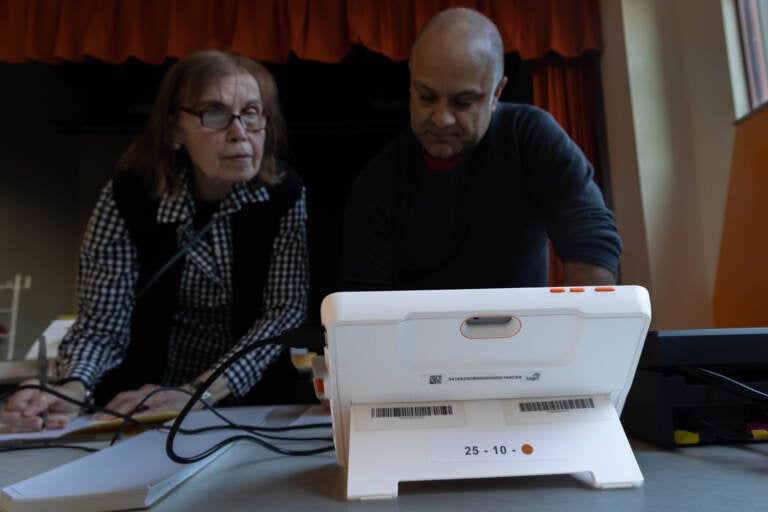
Philadelphia's first electronic voter rolls are operating on primary Election Day, May 16, 2023. (Kimberly Paynter/WHYY)
If you cast your vote in person for Philly’s primary, you’ll notice something different.
Election workers are for the first time ever using electronic poll books to check in voters, and verify they’re in the right polling place.
The brand new system does come with the risk of some hiccups.
Past issues with software led to a couple of false starts; the Office of City Commissioners have twice put off Philadelphia’s adoption of e-poll books. This Tuesday, some poll workers are concerned about a shortage of electrical outlets to keep devices powered.
But the commissioners say they’ve thoroughly tested the new system and made sure polling places can accommodate it. And the positives are significant:
Tablet computers give the election workers instant access to each voter’s information and help them make sure people with mail ballots don’t double-vote. The new system should speed up both in-person voting and vote-counting, according to the commissioners.
And they’ve been used in other places for years, Deputy Commissioner Nick Custodio noted.
More than 787,000 mail ballots were requested for Pennsylvania’s 2023 primary election. Nearly 64% were returned as of Monday morning.
If you’re still holding onto yours, there are several ways to turn it in.
Drop-off locations for Bucks, Chesco, Delco, Montco, and Philly can be found online. WHYY’s Billy Penn also has a map of election drop boxes across Philadelphia.
Have a mail ballot but prefer to vote in person? Bring your ballot (and all of the envelopes it came with) and surrender it to a poll worker. Once you’ve surrendered your mail ballot and signed a declaration, you can cast a regular ballot.
If you requested a mail ballot but didn’t receive one, head to your polling place and ask for a provisional ballot. Post-Election Day, officials will verify you didn’t already vote by mail and count your ballot.
Mail ballots must be delivered to a drop box or county election officials by the time the polls close at 8 p.m. Mail ballots postmarked by the deadline, but not yet received, do not count.
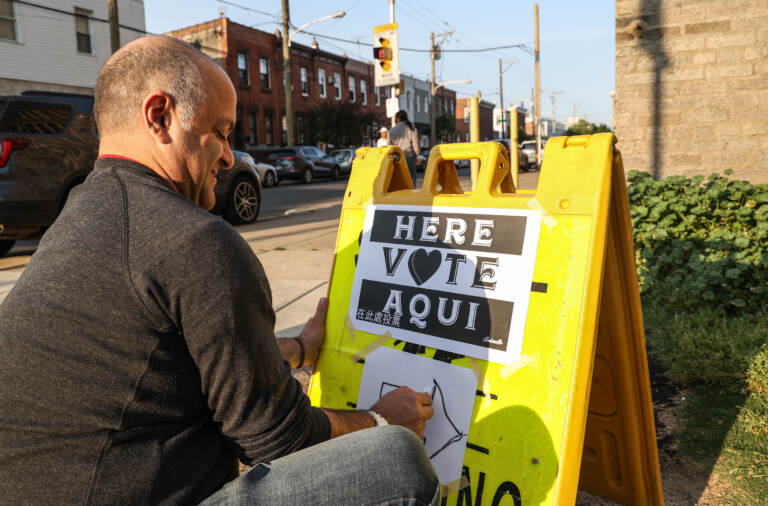
Jai Agrawal, minority inspector for Ward 25 in Philadelphia, posts a sign to indicate where to vote on primary Election Day, May 16, 2023. (Kimberly Paynter/WHYY)
Voters across Pennsylvania are heading to the polls today to cast ballots in the 2023 primary election. Polls close at 8 p.m.
Reporters from WHYY News and Billy Penn are following each of the major campaigns — including the race for Philly’s 100th mayor, all 17 City Council seats, and a Delco special election that could shift the balance of power in the state House.
As Election Day unfolds, follow WHYY’s live special coverage on WHYY.org, the WHYY App, and WHYY-FM 90.9.
Your voter game plan
- Have questions about the primary? Our 2023 elections hub has the answers.
- Looking for state- or city-specific info? Check out WHYY News and Billy Penn’s voter guides: Pennsylvania | Philadelphia
- Want to learn more about the candidates? Here are voter guides, by race.
- Curious about Philly ballot questions? Here’s a breakdown of what to expect.
- Voting in the suburbs? Here are some key races to watch:
- Voting for Pa. judges? Here’s what you need to know
- Voting by mail in Pa.? Here’s everything you need to know about filling it out and returning it.


